Ex-Chief Justice Sheikh Riaz Ahmad: Most corrupt judge in Pakistan’s history
posted by Muntaziri | November 2, 2013 | In Featured, Original ArticlesFrom Chief Justice Munir who invoked the doctrine of necessity, validating the dissolution of the first Constituent Assembly of Pakistan, to Chief Justices Maulvi Mushtaf and Anwarul Haq who colluded with a military dictator General Zia ul Haq in Zulfikar Ali Bhutto’s judicial execution, and from Chief Justice Shiekh Riaz Ahmad, the corrupt judge who validated General Musharraf’s military coup, to Chief Justice Iftikarh Chaudhry, the judge who acted as protector of TTP-ASWJ terrorists, Pakistan’s judicial history is full of corrupt and opportunist judges.
Shiek Riaz Ahmad is one such black spot on the face of Pakistani judiciary.
Sheikh Riaz Ahmad was a Chief Justice of the Supreme Court of Pakistan from February 1, 2002 to December 31, 2003. He was elevated to the CJ of Supreme Court of Pakistan on February 1, 2002 by the military dictator General Pervez Musharraf. Prior to this elevation, he served as a Judge Supreme Court of Pakistan (1997–2002), Chief Justice of Lahore High Court (1997) and Judge Lahore High Court, Punjab – the largest province of Pakistan (1984–1997). He was appointed to the Lahore High Court by the then Chief Minister Nawaz Sharif. Justice Riaz Ahmad worked as the Advocate General of the Punjab Province from 1980–84. He was notorious for being subservient to Nawaz Sharif family.
Justice Ahmad also served as the Member Election Commission of Pakistan from 1990–93 and played a key role in rigging elections in favour of Nawaz Sharif-led PML-N, along with Farooq Leghari and Najam Sethi. He was rewarded by PM Nawaz Sharif by being elevated to the position of CJ LHC in 1997.
Justice Sheikh Riaz Ahmad is notorious in Pakistan’s history because of his validation of military coup and illegitimate presidential referendum of General Musharraf, subservience to PML-N’s leaders Nawaz Sharif and Shahbaz Sharif and corruption in the shape of bribery (plots) and illegal extension beyond retirement age. His extension was abruptly cancelled and he was disgracefully removed by General Musharraf after his political deal with the MMA in 2003.
Among the important public inquiries that Justice Sheikh Riaz conducted include early 1980s riots on alleged blasphemy against Prophet Muhammad (pbuh), and the General Zia ul Haq’s plane crash inquiry conducted in the late eighties. Both inquiries proved to be an eyewash.
http://en.wikipedia.org/wiki/Sheikh_Riaz_Ahmad
PDF: Copy of Chief Justice Sheikh Riaz Ahmad’s judgment validating General Musharraf’s military coup and presidential referendum Justice Sheikh Riaz Ahmad’s_Detailed_Judgment_in_Musharraf_Case
EXTRACT FROM JUDGMENT OF THE SUPREME COURT IN CONSTITUTION PETITION NO. 15,
“QAZI HUSSAIN AHMED VS. PERVAIZ MUSHARRAF, CHIEF EXECUTIVE.”
Hussain Ahmed V. Pervez Musharraf Chief Executive (Sh. Riaz Ahmad, CJ)
P L D 2002 Supreme Court 853
Present: Sh. Riaz Ahmed, C.J., Munir A. Sheikh, Iftikhar Muhammad Chaudhry, Qazi Muhammad Farooq, Mian Muhammad Ajmal, Syed Seedar Hussain Shah, Hamid Ali Mirza, Abdul Hameed Dogar and Muhammad Nawaz Abbasi, JJ.
Qazi Hussain Ahmad, AMEER JAMAAT-E-ISLAMI PAKISTAN and others …………….Petitioners
Versus
General PERVEZ MUSHARRAF, Chief Executive and other………Respondents
Constitution Petition Nos. 15, 17 to 24 and Civil Petition No. 512 of 2002 decided on 27th April 2002.
SHORT ORDER
12. As far as the legal status of the Referendum Order in concerned, suffice it to say that it has been issued by the Chief Executive and the President of Islamic Republic of Pakistan in exercise of the powers conferred upon him by this Court in Syed Zafar Ali Shah’s case while validating the Proclamation of Emergency of the 14th day of October, 1999 and the Provisional Constitution Order No. 1 of 1999 and it has rightly been conceded by the learned counsel for the respondents that the said Order does not have the effect of amending the Constitution of Pakistan.
13. As regards the ground of challenge to the consequences flowing from the holding of referendum under the Referendum Order, apparently these questions are purely academic, hypothetical and presumptive in nature and are not capable of being determined at this juncture. Accordingly, we would not like to go into these questions at this stage and leave
the same to be determined at a proper forum at the appropriate time. Since no relief can be granted in these proceedings at this stage, the Constitution petitions are disposed of being premature.
14. In view of our findings in the above petitions, no order is required to be passed in Civil Petition for Leave to Appeal No. 512 of 2002, which is disposed of accordingly.”
Justice Riaz takes oath as CJ
By Our Staff Reporter (Dawn)
ISLAMABAD, Feb 1, 2002: Justice Sheikh Riaz Ahmad on Friday took oath as the Chief Justice of Pakistan. President Gen Pervez Musharraf administered the oath to the new Chief Justice at a ceremony held at the Aiwan-i-Sadr. The oath-taking ceremony was attended among others by federal ministers, senior judges of the Supreme Court, federal secretaries and other top government officials.Justice Sheikh Riaz Ahmad is the 18th Chief Justice of Pakistan.
http://archives.dawn.com/2002/02/02/top8.htm
http://beta.dawn.com/news/17908/justice-riaz-takes-oath-as-cj
Standoff with Bar
During Justice Ahmed’s tenure as Chief Justice of Pakistan, due to the standoff between the Government and the Bars on the one hand, and bench-bar on the other, Pakistan witnessed unprecedented events in the court rooms. The troubled judicial history of Pakistan re-played itself due to the superior judiciary’s legitimating of the military coup of General Musharraf by invoking the infamous ‘doctrine of necessity’ which states that the integrity of the state is of paramount importance such that when a constitutional government is overthrown, the usurping authority must be recognized so as to avoid anarchy.
The Supreme Court under CJP Sheikh Riaz validated General Musharraf’s 1999 coup in 2000 and ordered elections within 3 years of the military takeover. However, the bench-bar schism deepened during in later years as the apex court was viewed by independent sections of the bar as cooperative to the Executive. The senior Judiciary however claimed that their decisions to uphold military takeover was meant to facilitate the return of constitutional rule and democracy in the country. In 2002, elections, albeit controversial, were held and the Constitution of Pakistan was restored with amendments introduced by the military Government.
Political Controversies settled in the Courts: General Musharraf’s holding of referendum in 2002: The nine-member Supreme Court bench, headed by Chief Justice Sheikh Riaz Ahmad after conducting six day’s consecutive hearing in April 2002 held that Referendum Order was issued under the powers given to President Pervez Musharraf on May 12, 2000 by the Supreme Court. However, the Court hled that: “We would not like to go into these questions at this stage and leave the same to be determined at proper forum at the appropriate time. In November 2002, the Chief Justice also gave oath to President Musharraf before the parliament met to elect him as the President. The deepening of the bench-bar conflict climaxed when the President of Supreme Court Bar Association appeared before the apex court in the review petition relating to the appointment of judges in the Supreme Court and filed a “statement at the bar on behalf of the Supreme Court Bar Association holding that the Bar had no confidence in the independence of the Supreme Court. The review petition was dismissed by the Supreme Court for non-prosecution and “on merit”. In a judgment by the Chief Justice of Pakistan, the court opined that the contents of the application constituted gross contempt of court by using disparaging remarks about the judiciary. Two paragraphs of the application were deemed “scandalous, malicious and irrelevant” and the court ordered those paragraphs to be deleted. However, the Court concluded that it would have “proceeded to take action in the matter but exercised restraint.”
”An astute commentary on such state of affairs appeared in a Pakistani daily: “The legal fraternity also needs to realize that the judiciary does not exist in a vacuum and wholly outside the political system. When there is haze all around, how can one institution remain insulated from its darkening effect. Just as a flower does not bloom in a desert, the judiciary cannot continue to glow amidst the shadows of authoritarianism. The legal fraternity cannot choose to vindicate its position on any given issue by attacking the very institution which, despite all darkness, has still been a source of much enlightenment during the last three years. Had the judges not been vigilant during this period, much more would have been lost. Rather than assailing the institution of the judiciary, they should assail Bonapartism which weakens the role and independence of the judiciary. The legal fraternity should also be prepared to make personal sacrifices. How many members of the Bar Associations who passed the resolution expressing lack of confidence in the apex court have refused to accept briefs in private cases before that very court on the ground that they have no confidence in the court in its present composition? The lack of confidence cannot be selective and pitched to vary with the personal interests of the members of the Bar. The Bench and the Bar are indispensable for the successful administration of justice. One cannot exist without the other. An independent judiciary is anathema to most governments be they elected or military. The judiciary is the most effective and reliable check on the arbitrary exercise of power by governments. From a wider perspective, it is part and parcel of the democratic process. When all other institutions of the state fail the judiciary remains.” (Khalid Jawed Khan, Daily DAWN, November 2002 available online here.
The Chief Justice Sheikh Riaz Ahmad had banned entry of press photographers in premises of building of the apex court when the controversy between the judiciary and lawyers community was on the rise on the issue of extension in the age of judges of superior courts under Legal Framework Order.Since then no press or other form of media is allowed on the premises of the Supreme Court.
http://www.nationmaster.com/encyclopedia/Sheikh-Riaz-Ahmad
LHCBA demands CJ Sheikh Riaz to step down
LAHORE, Aug 16: Justice Munir A. Sheikh on Saturday took oath as the acting Chief Justice of Pakistan following the departure of Justice Sheikh Riaz Ahmad abroad. This is for the second time that Justice Sheikh has taken oath as the acting CJ in less than three weeks’ time. He had assumed this office last month too when the CJ went to Manila. Justice Khalilur Rehman Ramday administered the oath to the acting CJ. The Supreme Court judges and law officers attended the oath-taking ceremony while officer-bearers of the Pakistan Bar Council, Supreme Court Bar Association and the Lahore High Court Bar Association once again boycotted the ceremony to lodge their protest against the extension granted to judges in their respective tenures.
The LHCBA had already requested the acting CJ, who availed the three-year extension under the LFO on July 2 this year, to step down from his office and had claimed that it wouldn’t welcome him back in the Bar if he stuck to his decision of availing the extension.
Justice Sheikh is the sixth judge of the superior judiciary to enjoy an extended tenure under the LFO after Justice Sheikh Riaz Ahmad, Justice Qazi Muhammad Farooq (Supreme Court), Justice Raja Muhammad Sabir (Lahore High Court), Justice Ashraf Leghari (Sindh High Court) and Justice Abdur Rauf Khan (Peshawar High Court).
http://beta.dawn.com/news/135379/acting-sc-cj-takes-oath
Pakistan Bar Council’s Report
Irshad rewarded
The Chief Justice Irshad, on retirement, was rewarded when he was appointed Chief Election Commissioner. However, during this process, the then federal law secretary, Justice Faqir Muhammad Khokhar, who was a junior judge of Lahore High Court (placed at No. 13 in the list of seniority of the judges of the Lahore High Court) helped himself to an out of turn appointment as judge of the Supreme Court. His appointment was clear negation of the decision in Judges’ case and a clear abuse of the power enjoyed by the Chief Justice as Constitutional Consultee in the matter of appointment of judges 25. The retiring Chief Justice obliged the Law Secretary because the former was instrumental in his appointment as Chief Election Commissioner after his retirement. This and other appointments of junior judges to the Supreme Court were challenged before the Supreme Court in its original jurisdiction under Article 184(3) of the Constitution by the Pakistan Bar Council and the Supreme Court Bar Association.
However, such appointments were upheld by the successor Chief Justice Sheikh Riaz Ahmad, a close relative of the Justice (R) Irshad Hassan Khan, presiding over a specially chosen bench of judges, without regard to their seniority, predisposed to do so despite previous judgements of the Supreme Court to the contrary. The Supreme Court thus negated the principle of seniority in the matter of appointment of judges, a principle that the Court had itself laid down in its previous judgements. This judgement destroyed the edifice built in the matter of appointment of judges as Chief Justices or judges of the Supreme Court on the basis of seniority.
Seniority principle again violated
The standards for appointment to judiciary further deteriorated when Additional Judges of the Lahore High Court were appointed in 2002 from amongst those judges of the subordinate courts who had served as Accountability Court judges. Their merit was that they had been rendering judgements of conviction and sentencing the accused to severe punishments. The seniority of these judges as District and Sessions Judges was totally ignored. Senior most District and Sessions Judges in the Province of Punjab were ignored and five of the Lahore High Court judges were appointed from amongst the District and Sessions Judges without any regard to their
seniority. This was not only shocking but totally violative of the judgement in Judges’ case wherein the seniority was made an important criterion for appointment as judges or Chief Justices Once again Chief Justice Riaz violated the previous judgements of his own court and with a view to appear the military regime recommended appointment of junior judges from the subordinate judiciary for appointment as High Court judges.
Extension in retirement age of judges: Judges rewarded.
The matter did not end there. Some of the incumbent members of the judiciary particularly Chief Justice Riaz desired to be rewarded for the service he had rendered by giving judgements repeatedly in favour of the military rulers. After all the power to amend the
Constitution was not conferred on the Chief Executive just like that and without any expectation of return or reward. If the judges gave three years to a military regime to rule the country, why should they not be favoured in a similar manner. The judges were rewarded by extending their period of service for the same number of years through extending the age of retirement. This was accomplished by an amendment in the LFO or the eve of general elections. General Musharaf violated his own pronouncements made repeatedly while addressing the nation on television that no amendment in the Constitution would be introduced unless it was circulated in
advance for soliciting public comments. Two constitutional amendment packages had been circulated and none of them included the proposal of extending the retirement age of judges. This amendment in LFO was brought about in a most secretive manner with thinly veiled collusion between General Musharaf and Chief Justice Riaz. This was accomplished to protect their mutual personal interests at the cost of the national interest. This dubious deal between the Chiefs of Military and Judiciary was signed and sealed in the stealth of the night as if it was a commando operation. The judicial independence was mortgaged in return for three years extension of service of the judges.
The incumbent Federal Law Secretary was instrumental in having the provision of extension in retirement age signed by General Musharaf particularly when the General felt himself vulnerable which was the case on the eve of general elections on 10 October 2002 or thereabout. He was skeptical about the potential orientation of the Parliament as a result of the general elections, though he had manipulated these elections by extensive use of administration and intelligence agencies. Even then he wanted to have the support of a pliable Chief Justice who had compromised himself completely and had delivered verdicts repeatedly in his favour and would have no qualms of conscious in doing so in the future. The Chief Justice also used this vulnerable moment to impress upon the General his past services in giving favourable verdicts and desired an extension of three years in his tenure. To spread the spoils around, the Law Secretary Justice Mansoor Ahmad was rewarded by Justice Riaz by having him nominated to the International Criminal Tribunal which had been established to prosecute cases of genocide in Rwanda. Justice Mansoor had not served as judge even for one year but he was preferred over all senior and many competent judges for appointment to such coveted position. He was rewarded for cleverly managing the extension in the tenure of judges.
The LFO is the product of dubious partnership between the military and the judiciary and the extension in retirement age is designed to ensure perpetuation of the military rule behind the façade of a civilian or civilinized government. The Supreme Court has touched its lowest when its Chief Justice plaintively accepted enhancement in retirement age under most controversial and, in view of the Bar, invalid and unconstitutional LFO.
Retired judges
As a result of the above unconstitutional extension in the retirement age the following persons have already retired as judges of the superior courts:-
1. Justice (R) Sh. Riaz Ahmad of the Supreme Court of Pakistan. He attained the age of 65 on 8 March 2003 and stands retired under the Constitution.
2. Justice (R) Qazi Muhammad Farooq of Supreme Court of Pakistan. He attained the age of 65 on 8 January 2003 and stands retired under the Constitution from that date.
3. Justice (R) Abdur Rauf Khan Lughmani of the Peshawar High Court. He attained the age of 62 on 18 January 2003 and stands retired under the Constitution from that date.
4. Justice (R) M. Ashraf Leghari of the Sindh High Court. He attained the age of 62 on 6 March 2003 and stands retired under the Constitution from that date.
5. Justice (R) Raja Muhammad Sabir of the Lahore High Court. He attained the age of 62 on 14 April 2003 and stands retired under the Constitution from that date.
The Pakistan Bar Council and other representative bodies of lawyers have written to the above named retiring judges requesting them to retire on the date of retirement. It was stated respectfully in these letters that seeking retirement according to the age fixed in the Constitution would be the only honourable thing to do for the judges. Unfortunately these retiring judges cared more for their extension in service than any honour that would come their way. They stand shorn of their moral authority which forms the basis of legitimacy of judicial power. The most disappointing feature is the failure of former Chief Justice, Justice (R) Sh. Riaz Ahmad to retire on 8 March 2003. Due to his continuation, the composition of the Supreme Court is under cloud and the working of the Supreme Court since 8 March 2003 may come under serious challenge
leading to deep constitutional crises. The lawyers, in an unprecedented move, observed a Black Day throughout the country on 8 March 2003, the day of retirement of former Chief Justice Riaz.
The acts of the above named retiring judges in clinging on to their offices only establish their innate frailty that offices are dearer to them than honour.
The lawyers’ convention at Islamabad was announced to be held on 9 June 2003 in the Library Hall of Supreme Court Bar Association. It was also announced that a protest / direct action day would also be observed that day. The lawyers’ community, being a peaceful and law abiding community, does not believe in any violent or indecent means in their protests. The programme on 9 June 2003 was obviously meant to be held in peaceful and constitutional manner. It appears that the former Chief Justice Sheikh Riaz Ahmed panicked. After all he has to have guilty conscious for continuing unconstitutionally after attaining the superannuation age of sixty five. He asked the government security agencies to block all the access routes to the Supreme Court building in Islamabad. There were barricades and barbed wires at least five hundred meters away from the building of the Supreme Court on all sides of the building. Hundreds of lawyers from Islamabad, Rawalpindi and other cities who had come to attend the Convention were stopped at the barricades. Entire Islamabad appeared to be under some kind of siege and the residents of Islamabad suffered inconvenience due to this unnecessary panic on the former Chief Justice. However more than three hundred lawyers including representatives of all the Bar Councils and major bar associations throughout the country took out a peaceful procession on the Jinnah Avenue around 11 A.M. The procession was intercepted by the police near the intersection leading to the parade ground on the said Avenue. The lawyers, being
peaceful, did not confront the police and held their proceedings in the square peacefully for about an hour and half. The representatives of the lawyers addressed the gathering condemning vehemently the LFO and extension in the retirement age of judges.
In the evening of 9 June 2003, the retired Chief Justice further deprecated himself in the eyes of the lawyers fraternity by sealing the doors of the offices and library of the Supreme Court Bar Association on the first floor of the Supreme Court building. It was indeed a shameful act of unprecedented nature. Such disgraceful acts cannot deter the lawyers from their constitutional struggle for the restoration of the Constitution unadulterated by LFO, supremacy of the Parliament and independence of judiciary. The struggle would rather intensify further for attaining these objects particularly against those who have usurped the offices of the President and Chief Justice of Pakistan.
Corruption in judiciary
The judiciary in Pakistan has suffered from corruption throughout its history. However, it reached its peak during the past three years. Corruption during these years has been unprecedented. This problem has particularly become very critical on the assumption of office of Chief Justice by Justice (R) Sh. Riaz Ahmad in February 2002. The corruption at the highest
level in the judiciary has become so rampant that it is no longer a secret. It is openly discussed by the people in general who are seriously alarmed by this development. It has further undermined the independence and credibility of the judiciary. The military regime seems to be happy with corruption in judiciary because in its view the judges with compromised integrity would not dare to question any of its acts. A corrupt judge, and if he happens to be Chief Justice, could be easily manipulated by a dictatorial regime which maintains dossiers on the judges. A corrupt judge can be shown his dossier to make him fall in line with the government. The Supreme Judicial Council has comprehensively failed to take notice of widespread corruption in the superior judiciary. How can the Council take any action against persons who themselves either chair or
participate in the meetings of the Supreme Judicial Council.
Conclusion
The judiciary due to its role and performance for the last more than 3 years has relegated itself to the position of subservience to the military ruler. Its role has been to support the regime of General Musharaf without any regard to the constitutional dictates and the law laid down by the Supreme Court in its previous cases. It has been rewarded for its role by giving
extension by three years to the judges in retirement age. In fact this extension in age is primarily designed to protect General Musharaf in his pursuit to perpetuate himself in power. In the first place he has, through the LFO, shielded himself in power by continuing as Chief of Army Staff.
He has ensured that the armed forces are on his side to strengthen him and his position as President. Secondly, by continuing Justice Riaz as Chief Justice for three more years, he can count upon a pliable Chief Justice to manage verdict favourable to him in case he dissolves the National Assembly under his discretionary power to get rid of a hostile or recalcitrant Parliament. Thus the judiciary has been reduced to the level of being a protector of a military ruler who is bent upon contaminating the constitution to perpetuate himself in power.
The Judges’ case (Al Jehad Trust case) in 1996 followed by Asad Ali’s case established the principle of seniority for appointment as Chief Justices of the Supreme Court and the High Courts. These judgements have been completely demolished by upholding appointment of junior judges of Lahore High Court in order to cover up the questionable and self-serving deals by outgoing Chief Justice which have harmed the judiciary irreparably. However, the last nail in the
coffin of the judges’ case was struck when senior judges of the Lahore High Court were ignored in favour of a junior for appointment as Chief Justice of the Lahore High Court. Hence Justice Riaz, for self serving reason, has also undone the principle of seniority for appointment as Chief Justice of High Court.
The role of the judiciary in the history of the Pakistan has been extremely controversial. Chief Justices Muhammad Munir and Anwar-ul-Haq compromised the independence and credibility of judiciary due to their controversial judgment. There has been a continuing trend towards deterioration and degeneration during the past fifty years. However, Chief Justices
Irshad Hassan Khan and Sheikh Riaz Ahmed have destroyed the institution of judiciary as effective and independent organ of State. Corruption and incompetence in the judiciary have become the order of the day. The judiciary lost its respect and credibility due to their pursuit of offices and personal interests. They have unfortunately brought ultimate disgrace to the judiciary
The power of the Chief Justice for form benches has been misused throughout the history of Pakistan. It has been abused to the maximum during the past three years. It now appears that the government needs the services of only five judges, that is the Chief Justice of the Supreme Court and four High Courts, to obtain favourable verdicts. Musharaf has ensured that he has five Chief Justices predisposed towards him and that they would and have actually managed verdicts favourable to him all these years. To top it all, the Chief Justice of Pakistan alone can manage all the verdicts desired by the military rulers. Chief Justice Riaz has blatantly established how the power to constitute benches can be abused. This power should be curtailed and formation of benches should be regulated in such a way that a committee of judges consisting of Chief Justice and two or three senior most judges be responsible for constitution of benches.
RESOLUTIONS PASSED BY THE PAKISTAN BAR COUNCIL IN ITS 142ND MEETING HELD ON 08-03-2003 AT ISLAMABAD.
“The Pakistan Bar Council in its meeting held on 08-03-2003 strongly condemns Justice Riaz Ahmad and Justice Qazi Muhammad Farooq for not laying down their robes despite having reached the age of retirement under the Constitution. Henceforth, in the opinion of the Council, they have ceased to be judges and have lost legal and moral authority and justification to continue as judges. This unfortunate step on their part has led Pakistan to another serious constitutional crises because the Supreme Court has ceased to be constitutionally constituted because the Court is without a valid and Constitutional Chief Justice.
The Council has decided and calls upon all the Bar Councils and Bar Associations to socially boycott these retired judges and all other judges who attain the age of retirement. The Council calls upon all the Bar Councils and Bar Associations not to invite such retired judges in their functions and not to allow them to create any dissention or disunity amongst members of
the legal fraternity.”
http://pakistanbarcouncil.org/wp-content/uploads/2012/07/White-Paper_Complete_.pdf
Judge asked not to accept extension
2003-08-25
ISLAMABAD, Aug 24: Lawyers’ representatives have asked Justice Zahid Kurban Alavi, a Sindh High Court judge, not to accept extension of three years under the Legal Framework Order and leave the institution after attaining the constitutional age of retirement on Aug 20, 2003.
In a letter to Justice Zahid Kurban Alavi, the lawyers’ representatives, through Pakistan Bar Council secretary, said that the members of the legal fraternity across the country had rejected the LFO and the extension in the age of superannuation of judges of the superior judiciary. “We feel duty bound…to request you to return to the Bar and take an honoured place amongst the members of the legal fraternity.”
Those who have signed the letter sent to the SHC judge are Rasheed A. Razvi, member PBC; Abdul Haleem Pirzada, member PBC; Abu’l Inam, member PBC; Munir Malik, president SHC Bar Association; Yasin Azad, vice-chairman Sindh Bar Council; and Mohammad Ali Abbasi, President Karachi Bar Association.
ustice Zahid Kurban Alavi is the eighth judge who has availed himself of the extension, starting from the Chief Justice of Pakistan, Sheikh Riaz Ahmad. No judge has refused a three-year extension, which is dubbed by the lawyers’ community “dubious gift by the military government” for validating its rule for three years under the doctrine of necessity.
Those who have availed themselves of the extension are Justice Sheikh Riaz Ahmad (SC); Justice Munir A. Sheikh (SC); Justice Qazi Mohammad Farooq (SC); Justice Mohammad Sabir (LHC); Justice Karamat Nazir Bhindari (LHC); Justice Ashraf Leghari (SHC); Justice Zahid Kurban Alavi, (SHC); and Justice Abdur Rauf Khan, (PHC).
http://dawn.com/news/136678/judge-asked-not-to-accept-extension
Justice Munir to be CJ for LHC Bar
2003-03-20
LAHORE, March 19: The Lahore High Court Bar Association (LHCBA) announced on Wednesday that it would now be considering Supreme Court’s Justice Munir A. Sheikh the chief justice of Pakistan rather than Justice Sheikh Riaz Ahmad, whose tenure in the office “ended on March 8”.
LHCBA president Hafiz Abdul Rehman Ansari and other office-bearers told a press conference at the close of a 10-day anti-LFO camp that Justice Sheikh Riaz Ahmad was “no more the chief justice of Pakistan” after reaching the age of retirement on March 8.
They regretted that Justice Riaz did not quit his office and accepted the three-year extension of his service under the LFO. He said that since Justice Munir was the senior-most SC judge after Justice Riaz, the LHCBA would recognise him as the new chief justice in the light of SC’s judgment on March 20, 1996.
The LHCBA set March 22 as the deadline for all the judges of SC and high courts reaching the age of 65 and 62 respectively to vacate their offices. Hafiz Ansari termed the three-year extension of the service of judges as a “conspiracy” and urged the superior court judges to counter it and refuse to accept it.
Mr Ansari criticised the statement of Senate chairman on the LFO which, he said, would not become part of the 1973 Constitution without being approved by a two-third majority of the Parliament. He appreciated the efforts of lawyers for holding a successful anti-LFO camp and hoped that they would continue their struggle till the abrogation of LFO. He further announced that a seminar would be held on the LFO on March 26 and former chief justice Sajjad Ali Shah, Qazi Hussain Ahmad, Nawabzada Nasarullah Khan, and Makhdoom Javed Hashmi invited to it.
http://dawn.com/news/88586/justice-munir-to-be-cj-for-lhc-bar
Judges get extension
003-01-05
LAHORE, Jan 4: The retirement of chief justice of Pakistan and two other Supreme Court judges, scheduled earlier for 2003, has been stretched to 2006, following the enforcement of an amendment on Jan 1, prescribing three-year extension in the retirement age of both Supreme Court and high court judges.
Article 179 of the Constitution was amended through the Legal Framework Order (LFO) on Oct 10, 2002, under which the retirement age of SC Judges was enhanced from 65 to 68 years. However, the amendment was not enforced on the same date.
The new seniority list of the 37 Lahore High Court judges was issued on Thursday (Jan 2), confirming the enforcement of amendment to Article 195 of the Constitution governing the retirement age of high court judges.
Following the enforcement of the amendment, Chief Justice Sheikh Riaz Ahmad who was to attain the age of retirement on March 8, 2003, under the previous law would now retire in 2006. Two other SC judges — Justice Munir A. Sheikh and Justice Qazi Mohammad Farooq — would now retire on July 1 and Jan 5, 2006, respectively.
Under the new seniority list of the Supreme Court judges, the first judge to retire within next three years would be Justice Qazi Mohammad Farooq (with no judge retiring this year).
The extended date of retirement for the remaining 14 judges of the SC stands as:
Justice Tanveer Ahmad Khan (Jan 16, 2007), Justice Mian Mohammad Ajmal (Aug 14, 2007), Justice Syed Deedar Hussain Shah (Dec 10, 2007), Justice Hamid Ali Mirza (Sept 2008), Justice Rana Bhagwandas (Dec 19, 2010), Justice Mohammad Nawaz Abbasi (June 6, 2011), Justice Falak Sher (Sept 21, 2011), Justice Abdul Hameed Dogar (March 21, 2012), Justice Khalilur Rehman Ramday (Jan 12, 2013), Justice Sardar Mohammad Raza Khan (Feb 9, 2013), Justice Faqir Mohammad Khokhar (April 15, 2013), Justice Javed Iqbal (July 30, 2014), Justice Iftikhar Hussain Chaudhry (Dec 19, 2016).
One ad hoc judge, Justice Karamat Nazir Bhandari, will retire on Aug 17, 2009.
SCBA: Urging the legislature to abrogate this amendment, the Supreme Court Bar Association President, Hamid Khan, said the government had enforced it to prolong the tenure of judges whose oath was administered under the PCO. SCBA executive committee member Tariq Aziz said the enforcement of the amendment was a clear violation of the Constitution since the Supreme Court, while deciding the Zafar Ali Shah case in May 2000, had observed that the then chief executive could not make any amendment regarding affairs of judiciary.
http://dawn.com/news/76174/judges-get-extension
SC upholds referendum :No judgment on consequences of exercise
2002-04-28
ISLAMABAD, April 27: The Supreme Court ruled on Saturday that the holding of the referendum was a valid exercise, but refused to pass any judgment on the issue of consequences of referendum, saying: “we leave the same to be determined at a proper forum at an appropriate time.”
The Supreme Court, however, in its unanimous judgment, held that chief executive Pervez Musharraf validly removed Mohammad Rafiq Tarar and assumed the office of the president on June 20, 2001.
With regard to the consequences of the referendum, the court held: “We would not like to go into these question at this stage and leave the same to be determined at a proper forum at an appropriate time.”
The nine-member Supreme Court bench, headed by Chief Justice Sheikh Riaz Ahmad, after conducting hearing for six consecutive days, decided on Saturday that the Referendum Order was issued under the powers given to President Pervez Musharraf on May 12, by the Supreme Court bench validating military takeover on the doctrine of necessity.
Dismissing all petitions challenging the holding of referendum, the court in its 18-page judgment said that the Referendum Order did not have the effects of amending the Constitution of Pakistan.
As regards the grounds of challenge to the consequences flowing from the holding of the referendum, the court held that apparently these questions were purely academic, hypothetical and presumptive in nature and were not capable of being determined at this juncture.
“These question (consequences of referendum) are purely academic, hypothetical and presumptive in nature and are not capable of being determined at this juncture,” the court said in its order.
Qazi Hussain Ahmad, Amir of Jamat-i-Islami, had challenged the assumption of office of president by chief executive Gen Pervez Musharraf by removing elected President Mohammad Rafiq Tarar.
The court accepted the contentions made by the government lawyers that Rafiq Tarar remained in the office from October 12, 1999, to June 20, 2001, by virtue of the Proclamation of Emergency and not by force of his election.
“We hold that Chief Executive Order No 2 (removing Rafiq Tarar) and No 3 (assuming of office of president by Pervez Musharraf) have been validly issued by the Chief Executive of Pakistan in exercise of his powers under the Proclamation of Emergency of the 14th day of October, 1999, and the Provisional Constitutional Order No 1 of 1999 as validated by this court in Syed Zafar Ali Shah case. Consequently, this petition qua the issuance of writ of quo warranto is dismissed.”
The defence team, comprising Attorney-General Makhdoom Ali Khan, Sharifuddin Pirzada, Abdul Hafeez Pirzada, Maqbool Elahi Malik and Iftikhar Hussain Gilani, had argued that Rafiq Tarar had continued in office under the PCO 1 of 1999 as part of the present government for nearly two years.
It was further argued that Rafiq Tarar had been performing his functions on and in accordance with the advice of chief executive under the new dispensation and was party to various legislative and executive actions of the present government.
They further argued that he did not lodge any protest when he ceased to hold the office.
Besides Jamat-i-Islami, the Supreme Court Bar Association, Lahore High Court Rawalpindi Bench Bar Association, the Alliance for the Restoration of Democracy through Nawabzada Nasrullah Khan, Adal Trust through Mushtaq advocate, Syed Zafar Ali Shah, engineer Saleemullah and Waseem Rehan had challenged the holding of the referendum.
Disposing Maulvi Iqbal Haider’s civil petition for leave to appeal, the court held in view of the judgment, no order was required to be passed in the civil petition for leave to appeal.
Iqbal Haider of Awami Himayat Tehrik had asked the court to accept his appeal against the SHC order and direct that holding of the referendum was legal.
The SC bench consisted of Chief Justice Sheikh Riaz Ahmad, Justice Munir A. Sheikh, Justice Iftikhar Mohammad Chaudhry, Justice Qazi Mohammad Farooq, Justice Mian Mohammad Ajmal, Justice Deedar Hussain Shah, Justice Hamid Ali Mirza, Justice Abdul Hameed Dogar and Justice Mohammad Nawaz Abbasi.
http://dawn.com/news/407689/sc-upholds-referendum-no-judgment-on-consequences-of-exercise
No pressure on judiciary, says Chief Justice
2002-07-18
ISLAMABAD, July 17: Chief Justice Sheikh Riaz Ahmad said here on Wednesday Pakistan’s judiciary “is independent and dispensing justice without any fear or favour.” Talking to newsmen at a reception, the CJ said Pakistan’s judiciary was working without any pressure from any quarter, and was deciding the cases according to its conscience, no matter who the petitioner or the respondent were. Responding to a question that the Pakistan Bar Council has passed a resolution saying that Judiciary had ceased to be independent institution, the CJ said he had not read the PBC resolution. He, however, remarked it could be the view of the council and he would not comment on that. “I can only say this much that Pakistan’s judiciary is working independently, without any fear or favour.”
Attorney General Makhdoom Ali Khan, who was also present on the occasion, said the lawyers community had always been in the forefront of the struggle for political and civil rights. He, however, said if the lawyers paid more attention to their profession as being one wheel of the chariot of justice, the performance of judiciary would improve. If the lawyers paid more attention to their profession, the judiciary would be strengthened and its respect would increase.
http://dawn.com/news/48449/no-pressure-on-judiciary-says-chief-justice
6 SC judges validating army coup get retired
2002-12-06
ISLAMABAD, Dec 5: Out of the 12 Supreme Court judges who in May 2000 had validated the military takeover of Oct 12, 1999, under the doctrine of necessity, six have retired while the rest have been given extension in service of three years each.
Of the six retired judges, Justice Rashid Aziz Khan had to leave the institution along with Justice Malik Qayyum for showing ‘bias’ in a case against Benazir Bhutto and Asif Ali Zardari, while Justice Jehangiri and Justice Ijaz Nisar went home with honour.
Of the remaining three, Justice Irshad Hasan Khan was made the Chief Election Commissioner for three years with all the perks and privileges he had been enjoying while serving as the Chief Justice of Pakistan.
Justice Chaudhry Mohammad Arif, after the retirement, has become the Chief Justice of an African country, Gambia.
The offer had come to the Government of Pakistan through the foreign office and Justice Chaudhry was nominated by the government for the post.
Justice Abdur Rehman Khan has been appointed as the member of Federal Public Service Commission.
The present six judges — Justice Shaikh Riaz Ahmad, Justice Munir A. Sheikh, Justice Nazim Hussain Siddiqui, Justice Iftikhar Chaudhry, and Justice Rana Bhagwandas have been given an extension of three years.
The military government has also raised salaries of the judiciary manifold at a time when the salaries of all government officials including personnel of lower judiciary, have remained frozen.
In January 2002, the President increased the salary of the Supreme and high court judges by an average 30 per cent.The salary of a Supreme Court judge was raised to Rs52,000 against his earlier salary of Rs40,000. The salary of a high court judge is fixed at Rs49,000 per month. The Chief Justice of the Supreme Court has been given an increase of Rs12,000 per month and he will now draw Rs55,000. The increase was made from Dec 1, 2001.
Apart from the salary, a judge of the Supreme Court is entitled to free residence, all utility bills, officially-maintained car, cook, driver and a guard at his residence, all paid by the government.
After the retirement, a judge of the superior court is entitled to pension equivalent to 70 per cent of his salary or an average Rs37,000 along with the facility of commutation of pension up to 40 per cent.
A retired judge of the superior court is also entitled to 200 litres of petrol per month, telephone bills for 1,000 local calls, 1,000 electricity units, 12,000 cubic feet of gas, and water free of cost — or an average package of around Rs30,000.
http://dawn.com/news/70759/6-sc-judges-validating-army-coup-get-retired
CJ asks counsel to confine to referendum
2002-04-24 00:00:00
ISLAMABAD, April 23: The Supreme Court observed on Tuesday that Qazi Hussain Ahmad could not plead the case of Rafiq Tarar’s removal from the office of president who himself declared one day after the coming of military government into power that he had become part of the new system.
Chief Justice Sheikh Riaz Ahmad, presiding the nine-member bench, observed that Qazi Hussain Ahmed could not be permitted to plead the case of Rafiq Tarar who had not challenged his removal from the office of president.
Chief Justice also observed that petitioner had not specifically challenged the holding of referendum. He should argue if holding of referendum by Gen Pervez Musharraf was in accordance with Article 48-6 of the Constitution or not, he added.
Justice Munir A. Sheikh, senior judge, at the very outset of the proceedings, speaking for the court, observed that counsel for Qazi Hussain Ahmad, Dr Farooq Hasan, should keep in mind that his main challenge was removal of Rafiq Tarar from the office of President who was not before the court.
The counsel was further asked to explain why the removal of Rafiq Tarar was challenged after such a long time as the incident happened on June 20, 2001, and the petition was filed in April 2002.
Dr Farooq Hasan resumed his arguments by saying that whole structure of his arguments was that “Constitution is in operation with the exception of certain provisions which might be held in abeyance.”
PCO No.2 and 3, issued by the Chief Executive, Gen Pervez Musharraf, removing the validly elected President Rafiq Tarar and then appointing himself as President of Pakistan, were contrary to the constitutional provisions and must be struck down, the counsel stated.
The counsel also stated that Supreme Court in a previous judgment (Mian Nawaz Sharif case 1993) had held that any person, attempting to remove the constitutional functionaries, under any garb or device, was exposing himself to the vagaries of high treason as defined in Article 6 of the Constitution. “Article 6 must be given some meaning and there must be an end to subversion of the Constitution.”
Justice Munir A. Sheikh observed that the whole edifice of the present rule was based on the Proclamation of Emergency and when this structure would cease to exist a number of things would happen, including validation.
Justice Munir further observed that counsel should not spend much time on the issue that whether the present government was behaving like a constituent assembly as no constitutional package had been unveiled so far. When it would happen, the courts could be approached, he added.
Justice Munir pointed out that Supreme Court took suo motu notice of the order of banning political activities in the country and issued notice to the government in 2000. The petition was still pending.
The counsel stated the mandate of the present regime was to restore the civilian rule which it derailed on October 12, 1999.
He said Gen Pervez Musharraf being in the service of Pakistan, could not take part in any political activity. Even as President he was barred from “holding any office of profit in the service of Pakistan”, and Gen Musharraf could not remain President as well as Chief of Army Staff. On both the counts, there was a complete embargo on Gen Musharraf, he added.
After reading a portion of the SC judgment in the Nawaz Sharif case, the counsel posed a question to the bench: “Is it our fate to constantly remain in the shadows of condonations and doctrine of necessity.”
The election date, he stated, was approaching fast and the political scenario was totally confused as nobody knew who was eligible to contest and who was not. “Irresponsible statements are being made that such and such individuals will not be allowed to contest election,” he said.
Dr Farooq Hasan stated Referendum Clause (Article 48-6) was no substitution to the mechanism provided for the election of the president.
The court inquired whether president was part of the parliament. The counsel’s response was in affirmative. The court posed another question that if president was part of parliament, what was his position when the parliament was dissolved.
The counsel stated that president being part of the parliament, also had an independent position, and was repository of all state powers.
Justice Deedar Hussain Shah observed that Rafiq Tarar was elected by the parliament and provincial assemblies and he should have resigned after the dissolution of those institutions.
The counsel stated that observations were hypothetical and devoid of ground realities. There were judges who considered Justice Sajjad Ali Shah as the validly appointed chief justice, but when the CJ’s appointment was declared otherwise, those judges should also have resigned which was not the fact, the counsel stated.
Dr Farooq Hasan argued that Gen Musharraf, by assuming the office of the president, had changed the whole complexion of constitutional scheme regarding the form of government, changing it to presidential from the parliamentary form. He said this change was not permissible under the validation judgment.
Justice Iftikhar Mohammad Chaudhry observed that similar things happened in 1984 when the Chief of Army Staff became the president and elections under the same clause were held for the identical purposes.
The counsel stated there was a difference in what happened in 1984 and what was happening now. In 1984, Constitution was held in abeyance as martial law was imposed in the country, and everything was done under extra-constitutional instruments.
Now the Constitution is the supreme law of the land and no extra-constitutional method could be resorted to. He said that subversion of the Constitution could not be allowed again and again. The counsel stated that Rafiq Tarar was required to continue as president till December 2002. “He did not resign and was shunted out, these are the ground realities,” the counsel stated.
Dr Farooq said president who “represents the unity of the Republic” should not have been subjected to such humiliation, specially when the confederal constitutions were being prepared by Mr Pirzada, now representing the federation.
Syed Sharifuddin Pirzada was quick to respond that he was not the author of that document. Abdul Hafeez Pirzada, sitting next to Syed Sharifuddin, stated that document being referred to by the counsel was a mere proposal and he should state the facts correctly.
Dr Farooq Hasan replied he was stating the facts as those were unfolding.
Reverting back to the issue of holding of referendum, the counsel said the provision was not meant for the election of president.
The counsel stated the referendum which Gen Pervez Musharraf was holding without electoral rolls, was a clear fraud with statutes. In the coming referendum, he said, anybody could vote anywhere. Electoral roll was always the central key to every kind of electoral process which was missing in the present exercise.
The counsel, who was still on is feet when the court rose for the day, assured the court that he would complete his arguments on Wednesday.
The SC bench consisted of Chief Justice Sheikh Riaz Ahmad, Justice Munir A. Sheikh, Justice Iftikhar Chaudhry, Justice Qazi Mohammad Farooq, Justice Mian Mohammad Ajmal, Justice Deedar Hussain Shah, Justice Hamid Ali Mirza, Justice Abdul Hameed Dogar and Justice Nawaz Abbasi.
http://dawn.com/news/407523/cj-asks-counsel-to-confine-to-referendum
Corruption of CJ Riaz: SC to hear many cases afresh
2004-02-16
ISLAMABAD, Feb 15: The Supreme Court office has decided to place over a dozen cases for hearing afresh, as a bench headed by former chief justice after reserving the judgements has retired without announcing them, causing great difficulties for the litigant parties.
Sources said that at least one dozen cases whose hearing had been completed had been relisted for rehearing as the judgements were not written. In one case, civil appeal No. 1356/96, titled as Bolan Beverages (Pvt) Limited versus Pepsico Inc, the judgement was written and it was submitted to the chief justice for his signatures 18 months prior to his retirement.
The then chief justice, however, kept the file with him till the time he left the court. The Supreme Court office has at present decided to fix the case for fresh hearing.
Justice Sardar Raza Khan, who authored the judgement, has reportedly written on the file that he had, after writing the judgement, submitted it to the then chief justice, Sheikh Riaz Ahmad, for “perusal, opinion if any, and if approved for signature” on July 23, 2002.
Justice Ahmad left the Supreme Court on Jan 1, 2004 after the decision to offer a three-year extension to the judges of the superior judiciary was withdrawn.
Two prominent counsels were representing the parties to the beverages case. Syed Sharifuddin Pirzada represented Bolan Beverages (Pvt) Limited and Pepsico Inc was represented by Barrister Khalid Anwar. Stay order granted in 1999 in the case was to the day continuing.
In another case regarding a ban on holding of Walima reception, a bench headed by the retired chief justice had declared it in the open court that the restriction was illegal, but never wrote the judgement for two years.
The former chief justice, however, presided over a meeting of Pakistan Law Commission which recommended to the government to make fresh legislation for restricting meals in marriage parties.
The same bench headed by the former chief justice had reserved its judgement on the petition of seven retired high court judges who were not given pension because they had not completed five-year service before they reached the retirement age on April 28, 2003.
The joint petition filed by Justice Aqil Mirza (retired), Justice Abdul Hafeez Cheema (retired), Syed Sharif Hussain Bukhari (retired), Justice Ghulam Sarwar (retired), Justice Rao Iqbal Ahmad Khan (retired), Justice Azam Khan (retired) of the Peshawar High Court was heard for many days before the hearing was concluded. The judgement was never annouced. The SC office has decided to fix it before another bench for fresh hearing.
http://dawn.com/news/351071/sc-to-hear-many-cases-afresh
We never learn from history-5
By Ardeshir Cowasjee
Air Marshal Asghar Khan’s human rights petition (HRC 19/96) remains unheard. Chief Justice Sheikh Riaz Ahmad is currently in South Africa, and when he returns he will preside over this country as its acting president in the absence of the president who will be away in the United States. He may, therefore, not have the time or inclination to form a bench to hear Asghar’s case, to order that it be decided quickly, or to order that pending the decision handed down, those who are prima facie guilty of rigging elections in the past be disqualified for the time being from contesting the upcoming elections. Our former Chief Justice of Pakistan, Sajjad Ali Shah, in his book ‘Law Courts in a Glass House’, (OUP 2001) touches upon the Inter-Services Intelligence department’s role in this country’s electoral process.
http://archives.dawn.com/weekly/cowas/20020825.htm
KARACHI: Lawyers vow to get LFO scrapped
SHUJAAT ALI KHAN
2003-05-18
KARACHI, May 17: A lawyers convention resolved here on Saturday to continue the struggle against the Legal Framework Order (LFO) and warned the opposition parties against any compromise.
“The Order is a device to perpetuate General Pervez Musharraf in the self-assumed office of President which he has, like past military rulers, usurped through extra-constitutional means,” a resolution adopted by the convention said. The resolution described the LFO as a well-calculated attempt by Gen Musharraf to amend the Constitution to promote his ‘personal ends’.
The enhancement of the superior court judges’ retirement age, the resolution said, was nothing short of ‘political bribery’ aimed at undermining the judiciary’s independence and credibility. It has no legal validity and the retiring judges should lay down their robes on reaching the constitutionally-prescribed age of superannuation.
Through another resolution, the convention demanded of the United States and its allies to withdraw their troops from Iraq and Afghanistan and let their peoples elect their rulers.
Meanwhile, a joint action committee of lawyers would decide on the future course of action next month. A ‘white paper’ on the superior judiciary covering the 1999-2003 period was ready and would be released at a convention scheduled to be held in Islamabad.
Participants of the convention marched to the Karachi Press Club to initiate a ‘direct action’ to get the LFO scrapped.
The convention was co-sponsored by the Pakistan Bar Council and the Supreme Court Bar Association. Presided over by SCBA chief Hamid Khan, it was addressed by former chief justice Saiduzzaman Siddiqui, former Supreme Court judges Fakhruddin G. Ebrahim and Wajihuddin Ahmed and Justice (r) Tariq Mahmood of Balochistan High Court.
Among other speakers were PBC vice-chairman Mian Abbas, executive committee chairman Kazim Khan and members Latif Khan Khosa, Abdul Haleem Pirzada and Qazi Anwar; vice-chairmen of the Sindh, Punjab and Balochistan bar councils Muhammad Yasin Azad, Chaudhry Mohammad Arif and Zahoor Ahmed Shahwani; presidents of Lahore, Sindh and Balochistan high court bar associations Hafiz Abdur Rehman Ansari, Muneer A. Malik and Senator Amanullah Kanrani; President of Karachi Bar Association Mohammad Ali Abbasi; and Ali Ahmed Kurd and Chaudhry Ikram from Quetta and Islamabad bar associations. The SHCBA Secretary, Yawar Farooqui, and KBA Secretary, Saathi Ishaq, conducted the proceedings.
Earlier, in his address, Justice Siddiqui said the LFO should be introduced as a bill in the parliament in accordance with the procedure prescribed by Articles 238 and 239 of the Constitution. Any attempt to ‘superimpose these amendments’, he warned, would be counter-productive and would lead to ‘further fragmentation of society’ at a juncture when the country needed harmony.
Justice Ebrahim said he was a ‘terribly worried man’ today and was deeply concerned over the state of the judiciary, which had been corrupted by successive military regimes. Referring to a publication titled ‘Supreme Court Report-2001’, he pointed out that it had 96 ‘colour photographs’ of the then chief justice. His wife told him to go to a psychiatrist when he asked her to give him about a dozen photographs for a magazine. He said Justice Irshad Hasan Khan was the real author of the LFO as it was he who conferred unsolicited powers of amending the Constitution on Gen Musharraf.
Justice Ahmed said of the six Supreme Court judges who declined to take oath under the Provisional Constitution Order in the year 2000, he was the only one who could resume the office straightaway (being less than 65). “I don’t need to be sworn in as my constitutional oath is still intact,” he added. He said if the purpose was to end ‘adventurism’ for all times, there should be no compromise on the LFO, which was self-contradictory even otherwise. The army command should not remain concentrated in one hand, he said. PPP Senator Latif Khosa assured the convention that the Constitution Committee, of which he was a member, would not strike a deal over the LFO. He said the judges’ retirement order was, in fact, promulgated on October 13, 2002, after the general election but was ante-dated to October 9, 2002, and made part of the LFO to evade the deadline for constitutional amendments.
Hamid Khan called for trial of military rulers and the superior court judges who ‘collaborated’ with them under Article 6 of the Constitution to usher in democracy and independence of judiciary.
Endorsing his demand, Justice Ahmed called for trial of ‘political collaborators’ also so that no PML-Q could be formed in future.
Hafiz Ansari warned against ‘conspiracies’ to sabotage the lawyers’ movement. He blamed Chief Justice Shaikh Riaz Ahmad for a petition filed by Dr Aslam Khaki for disqualification of the MMA parliamentarians for being non-graduates. Vice-chairman of Balochistan Bar Council Zahoor Shahwani’s demand that Karachi should be declared a part of Balochistan along with Jacobabad and Dera Ghazi Khan caused quite a rumpus in the convention. He refused to withdraw his call, saying: “It is against our traditions.” The chair had to give a ruling to pacify the protesters.
http://dawn.com/news/102273/karachi-lawyers-vow-to-get-lfo-scrapped
Musharraf, CJ Sheikh Riaz Ahmad be tried for treason: ex-CJ Sajjad Ali Shah
2003-03-27
LAHORE, March 26: Politicians and lawyers have demanded the trial of President Pervez Musharraf and superior court judges on “treason charges for conspiring against the sovereignty of the country and abusing the will of general public.”
They were speaking at a seminar arranged on Wednesday by the Lahore High Court Bar Association (LHCBA) on “constitution, parliament and LFO.”
PML-N acting president Makhdoom Javed Hashmi vowed that he would move parliament for president’s trial under Article 6 of the 1973 constitution for what he said committing treachery. He claimed that the president did not have the locus standi to issue the LFO nor was he authorized to amend the constitution. “The parliamentarians will not let him enter the National Assembly premises as he does not deserve to be considered president of Pakistan.” Hashmi said the Supreme Court also could not authorize any individual to amend the constitution as it was the prerogative of parliament.
Supreme Court Bar Association (SCBA) president Hamid Khan said former president Rafique Tarar should have resisted the October 12, 1999, coup or, at least, he should have quit the same day instead of being ‘removed’. He said the real democracy would dawn the day the military ruler and superior court judges were tried for treason. The SCBA president claimed that grant of three-year ruling time to the former military regime was never an issue before the Supreme Court in the Zafar Ali Shah case. Rather, it had to decide whether the October 1999 intervention was constitutional. “This SC judgment has strengthened dictatorship in the country,” he observed. Hamid Khan claimed that the provision regarding three-year extension in the retirement age of the superior court judges was dropped from the first package of the LFO approved on Aug 21, 2002, since the then law ministry had allegedly got it included in the package through fraudulent means. However, this provision was finally approved on the night of Oct 9, considering that this amendment would not get highlighted in the local press due to the general elections. The SCBA, in its meeting of Oct 26, had condemned the extension declaring it the last nail in the coffin of judiciary independence, he said. According to him, former chief justice Irshad Hassan Khan was made the Chief Election Commissioner following a deal for supporting former military regime’s cause of bringing its patronized candidates through rigging.
Jamaat-i-Islami Ameer Qazi Hussain Ahmad claimed that President Musharraf had recently conveyed a message to some politicians that he was willing to withdraw the LFO provided he was not opposed as COAS. Qazi quoted Musharraf as conveying that he needed a “level of comfort” in the current political setup and needed support from politicians on the issue.
“Now he is looking towards the politicians for his future role instead of his reliable colleagues from the army,” claimed the Qazi, ruling out any parliament support for the president. On behalf of the ARD, Qazi backed the LFO provision of enhancing the number of seats in the national and provincial assemblies but refused to validate all those provisions “safeguarding the interests of a dictator.”
Former chief justice Sajjad Ali Shah termed three-year extension in the superannuation age of superior court judges “bribery” to the judiciary. He said such an extension was not permissible under the constitution and had been granted by the military rulers to seek legal support from the judiciary for their unconstitutional acts. “The Doctrine of Necessity should be buried once for all in Pakistan since it is used to declare all the illegitimate actions as legitimate and if it is allowed to prevail, it will harm the sovereignty of the country,” he observed. According to him, parliament alone was authorized to ratify the LFO under the Doctrine of Ratification. “The LFO should be presented before the sitting Parliament. Though crippled, it can stamp its authority by deciding its (LFO) fate.” About the treason trial, Shah said no one had ever been tried under Article 5 and 6 of 1973 Constitution. “Right now it seems impossible because it is the federal government which takes cognizance of such an offence and the Jamali government is not expected to go against Musharraf. Nevertheless, he demanded trial of those judges who delivered “faulty judgments” in support of the Musharraf regime and the president himself under treason charges.
The former chief justice further proposed that SC judgment in the Nusrat Bhutto case should be revised by its sitting 17 judges since it was delivered by nine judges of the SC and now its judicial review was a must. According to him, the SC had given authority to former president Ziaul Haq to amend the constitution through its judgment delivered in the Nusrat Bhutto case and this precedent should now be abrogated by the sitting judges of the SC to stop its repetition in future.
ARD chairman Nawabzada Nasrullah Khan was of the view that currently there was no elected president in the country. He said the procedure adopted for the removal of former president Rafique Tarar was not covered by the constitution. President Musharraf was wearing too many caps on his head which could endanger the sovereignty of the country, he feared.
He declared last year’s general election as the worst-ever example of rigging and alleged that the administration on each level had patronized its candidates.
LHCBA president Hafiz Abdul Rehman Ansari and ANP leader Advocate Ehsaan Wyne also opposed the LFO and sought a joint struggle for its abrogation. Both accused the judiciary of supporting it just to enjoy three-year extension.
Later on, the LHCBA members unanimously approved a resolution saying they would not accept the LFO as part of the constitution. It said that Justice Sheikh Ahmad Riaz and Justice Qazi Farooq were no more judges of the SC and should vacate their offices forthwith after having reached their retirement age earlier this year.
http://dawn.com/news/89708/musharraf-judges-be-tried-for-treason-ex-cj
LFO part of the Constitution?
SHUJAAT ALI KHAN
2003-12-27
KARACHI: The Constitution (Seventeenth Amendment) Bill, tabled in the National Assembly on Friday, retains the Legal Framework Order, which was promulgated on Aug 21, 2002, as part of the basic law, presumably as its sixteenth amendment. Several LFO provisions neither expressly amended nor omitted by the bill are evidently intended to remain in force.
Among such provisions is an insertion in Article 270B that afforded constitutional protection to the October 2002 general election and the assemblies sired by it. Another provision featuring in the LFO but not in the amendment bill is Article 270C, which declared that the superior court judges who took oath under the order of 2000 or lost their office on failure to take a new oath shall be deemed to have been appointed or retired under the Constitution.
The three-year extension, given to judges by amending the LFO on Oct 10, 2002, has been withdrawn. The bill, however, contains no provision to validate the decisions rendered by them after their attaining the original age of superannuation. Incidentally, the three members of the Supreme Court bench that dismissed a direct petition against the LFO on Oct 7, 2002, would lose their robes under the new amendment. They are: Chief Justice Shaikh Riaz Ahmad, Justice Munir A. Shaikh and Justice Qazi Mohammad Farooq. Justices Nazim Husain Siddiqui and Iftikhar Mohammad Chauhdry were the remaining two members.
http://dawn.com/news/131213/lfo-part-of-the-constitution
Bar sets up camp against LFO
2003-03-11
LAHORE, March 10: In continuation of its ongoing campaign against the LFO, the Lahore High Court Bar Association on Monday set up a 10-day anti-LFO camp at the LHC.
Inaugurating the camp, LHCBA President Hafiz Abdul Rahman said the lawyers’ struggle against the LFO would go on till its abolition. He reiterated Bar’s warning of stern action against the opposition parties for showing any flexibility in their stance.
The opposition parties’ leaders and people of all walks of life would also be invited to the camp, Mr Rahman said.
Supreme Court Bar Association President Hamid Khan lauded the lawyers’ efforts in staging countrywide rallies against the LFO on March 8.
He claimed that all the Bar associations in the country did not accept Chief Justice Sheikh Riaz Ahmad and Justice Qazi Farooq of the Supreme Court as sitting judges, as they did not quit their offices on their respective dates of retirement this year. They decided to continue with their jobs in the three-year extended tenure given to the superior courts judges.
SCBA Vice-chairman Muhammad Arif Chaudhry and former Provincial Law Minister S M Masood also spoke on the occasion. The camp will be set up till March 20.
http://dawn.com/news/87313/bar-sets-up-camp-against-lfo
Lawyers not allowed to enter SC building
2003-06-10
ISLAMABAD, June 9: Lawyers who had assembled here from all over the country to hold a convention on the LFO were on Monday barred by police from entering the premises of the Supreme Court and forced to hold their gathering on the road outside.
Lawyers’ representatives, led by Hamid Khan, president of the Supreme Court Bar Association, and Mian Abbas, vice-chairman of the Pakistan Bar Council, were not allowed to go beyond the Blue Area on Quaid Avenue, as thousands of policemen, in full anti-riot gear, determinedly blocked them at what is called Parade Chowk.
Numbering about 300, the lawyers, including senior advocates of the Supreme Court, retired high court judges, and some lawyers-turned-legislators, attended the road-side convention and vowed to continue their struggle for the revival of the 1973 constitution as it was before October 12, 1999.
The lawyers chanted slogans “No to LFO, Go Musharraf Go”, and “Go Riaz Go”. They also burnt copies of the LFO, photographs of Chief Justice Sheikh Riaz Ahmad, and the Supreme Court Registrar’s order in which he told them that they would not be permitted to use SC premises for holding their convention.
In an unusual display of the states’ coercive apparatus, all routes leading to the Supreme Court on Constitution Avenue were barricaded and very few persons were allowed to go beyond Radio Pakistan in the east, the PTV station in the west and from Parade Chowk in the north.
Even the journalists who daily visit the Supreme Court for coverage were not allowed inside till 3.30pm. Such security arrangements were only seen in the past when opposition parties had given calls for a long march on Islamabad.
Those who addressed the protesting lawyers included Mr Hamid Khan, Mian Abbas, Hafiz Abdur Rehman Ansari, president of the Lahore High Court Bar Association, Munir Malik, president of the Sindh High Court Bar Association, Wakeel Zaman Khattak, president of the Peshawar High Court Bar Association, Mohsin Javed, president of the Balochistan High Court Bar Association, Kamran Mustafa of the Balochistan Bar Council, Umer Hayat Sindu of the Lahore Bar Association, Senator Latif Khosa, and Hafiz Hussain Ahmad of the MMA.
The bar leaders in their speeches said the government was trying to mislead the people by using the official media to suggest that lawyers were divided on the LFO issue.
They said that even after using all its machinery, the government could manage to get an invitation from only one district bar association out of 100 such associations. They said all lawyers’ representatives were unanimous on the issue of the LFO, and extension in the retirement age of the superior court judges.
Addressing the lawyers, who had braved the scorching sun of June, the bar leaders said that they would continue their struggle for the revival of the 1973 Constitution as it was on October 12, 1999.
They said that no amendment in the Constitution was possible through LFO, and it needed parliament’s approval. They said that if the LFO was accepted it would subvert the Constitution, undermine the federal parliamentary democracy by conferring discretionary powers to dissolve national and provincial assemblies, impose an un-elected body like the NSC and deprive the judiciary of its independence.
The lawyers rejected what they called the “farcical referendum” of April 30, 2002, and said Gen Musharraf was not an elected president as he claimed, and election of the president was due under the mechanism provided in the Constitution.
They said that enhancing the retirement age of judges was a blatant violation of the principle of the independence of the judiciary. They announced that they would issue a white paper on the role of Pakistan’s judiciary on June 28 in Islamabad, and would announce a date for a similar convention in Quetta.
Meanwhile, a press note issued by the registrar of the Supreme Court said that the lawyers convention could not take place on the court premises and the Supreme Court continued functioning smoothly. It said: “In pursuance of the orders of the Supreme Court administration, security arrangements were made by the police in and around the Supreme Court building to obstruct the holding of All Pakistan Lawyers convention proposed to be held in the Supreme Court premises. Only person concerned with the hearing of their cases were allowed to enter the building and no untoward incident took place in the court building. The Lawyers Convention could not take place in Court premises. The Supreme Court functioned in five benches as per routine and disposed of 17 cases.”
http://dawn.com/news/105905/lawyers-not-allowed-to-enter-sc-building
Bhandari opts for extension under LFO: Bar expresses disappointment
2003-08-20
LAHORE, Aug 19: Justice Karamat Nazir Bhandari, a judge of the Supreme Court working on an ad hoc basis, has availed himself of three-year extension offered under the Legal Framework Order. His extension period began on Aug 18 (Monday).
Justice Bhandari, who is still on the Lahore High Court’s existing strength of 37 judges due to his elevation as the SC judge on ad hoc basis, turned 62 on Aug 17. This, according to the previous law, was the retirement age for a High Court judge. However, it was stretched to 65 years under an LFO provision. In case Justice Bhandari is confirmed as the SC judge, he will get another three years service under the LFO because the retirement age for the SC judges has been extended to 68 years.
He is the seventh judge of the superior courts to avail himself of the extension after Sheikh Riaz Ahmad, the chief justice of Pakistan, Justice Munir A Sheikh and Justice Qazi Muhammad Farooq (SC), Justice Raja Muhammad Sabir (LHC), Justice Ashraf Leghari (Sindh High Court) and Justice Abdur Rauf Khan (Peshawar High Court).
Meanwhile, office-bearers of the Pakistan Bar Council, Supreme Court Bar Association, Lahore High Court Bar Association and Bar associations of other provinces wrote a letter to Justice Bhandari, reminding him that he had “retired” on Aug 17.
The Bar representatives claimed in the letter that the fate of the LFO was still undecided, as it had neither been presented in parliament for approval nor had it been accepted as a part of the 1973 Constitution by the lawyers.
LHCBA President Hafiz Abdul Rahman Ansari told newsmen at a conference that the Bar had conveyed in unequivocal terms to the judiciary through its letter, holding that the LFO was merely an order of President Gen Pervez Musharraf and didn’t have any legal identity. “Only parliament can extend or curtail the retirement age for the superior courts’ judges, which Gen Musharraf is not authorized to do.” He added: “Those availing themselves of the extension have disappointed the members of the Bar association, who had pinned high hopes on them.” The LHCBA president iterated that the legal fraternity would continue its struggle against the LFO unless it was struck down by parliament. “We want to make it clear that the lawyers will not accept the provisions of three-year extension (offered to judges), and president’s discretion to dissolve the assemblies,” Mr Ansari asserted.
http://dawn.com/news/135837/bhandari-opts-for-extension-under-lfo-bar-expresses-disappointment
Multan DBA reaffirms opposition to LFO: Reception for CJ
2003-03-02
MULTAN, March 1: The Multan District Bar Association reiterated on Saturday its opposition to the Legal Framework Order in the presence of the chief justice of Pakistan.
Speaking at a reception in the honour of Chief Justice Sheikh Riaz Ahmad, DBA president Sheikh Jamshed Hayat said the Multan Bar believed that the LFO was a blot on the face of the constitution. “Democracy, in its worst form, is better than dictatorship.” He said military dictators in Pakistan had ruined the country by derailing democracy time and again.
The DBA president received a thunderous applause from the audience when he urged the legislators not to make the LFO part of the constitution.He observed that intentionally or unintentionally the establishment had diverted the job of legislation from parliament to the courts.
About the problems being faced by the lawyers and litigants in Multan, the DBA president demanded a compact judicial complex on the pattern of Lahore’s Aiwan-i-Adl. At present, the courts were scattered in different parts of the city.
Mr Hayat proposed that the judicial complex could be constructed at the police lines which was adjacent to the district courts.
He also underlined the need for the automation of courts’ record and a modern library in Multan for the lawyers.
He urged the chief justice to frame such rules that could ensure involvement of young lawyers, especially the women lawyers, in cases like murder and Islamic laws. Mr Hayat further demanded that the government should make compulsory the document preparation through lawyers.
Chief Justice Sheikh Riaz Ahmad, however, avoided issues like the LFO in his key speech. He mainly spoke about the period he spent in Multan when he was first appointed as a high court judge in 1984. The chief justice said he felt more pride in being a lawyer rather than a judge. He said that within a year after becoming the CJ, he had succeeded in constituting the National Judicial Policy Commission through an ordinance. He said after getting reports from the chief justices of the high courts for the improvement of judicial system, he recently held meetings with the finance department and directed the people there to execute the plan for the uplift of judicial infrastructure in the country. He said the plan to establish judicial complexes in the country with the help of the Asian Development Bank would be started from south Punjab. He said the project for the automation of courts’ record throughout the country had been approved and would soon be implemented. He urged the lawyers to develop reading habit and avoid unnecessary delays in the disposal of cases.
Later, when a journalist asked him about the future of LFO, the CJ said: “We will see when it will be put up before us.”
APP ADDS: Chief Justice Sheikh Riaz Ahmad said facilities would soon be provided to the subordinate judiciary.
Provision of facilities to subordinate judiciary and the Bar associations was essential to aid process for administration of justice, he said.
Apart from accommodation facilities for civil judges and additional district and sessions judges, pick and drop facility would also be provided to them.
http://dawn.com/news/84800/multan-dba-reaffirms-opposition-to-lfo-reception-for-cj
………
Ranjah joins Musharraf cabinet
Khalid Ranjah took oath yesterday as Pakistan’s new law and justice minister replacing Shahida Jamil who has been retained in the cabinet and given charge of other ministries.
By Shahid Husain
March 14, 2002
Khalid Ranjah took oath yesterday as Pakistan’s new law and justice minister replacing Shahida Jamil who has been retained in the cabinet and given charge of other ministries.
Chief justice Sheikh Riaz Ahmad, who is acting as president in the absence of President Pervez Msuharraf, administered the oath.
Ranjah has served as law minister in the province of Punjab before his elevation to the federal cabinet. President Musharraf, currently on an official visit to Japan, has also made adjustments in the portfolios of two other ministers.
Shahida Jamil, who hails from Karachi, has been given charge of the ministry of environment, local government and urban affairs. Owais Ghani has assumed the charge of ministry of labour, manpower and overseas Pakistanis.
http://m.gulfnews.com/ranjah-joins-musharraf-cabinet-1.380937
……
Chief Justice Sheikh Riaz Ahmad’s remarks about Musharraf’s coup
Probably, the situation could have been avoided if Article 58(2)(b) of the Constitution had been in the field, which maintained parliamentary form of government and had provided checks and balances between the powers of the President and the Prime Minister to let the system run without any let or hindrance to forestall the situation in which Martial Law can be imposed. With the repeal of Article 58(2)(b) of the Constitution, there was no remedy provided in the Constitution to meet the situation like the present one with which the country was confronted, therefore, constitutional deviation made by the Chief of the Army Staff, General Pervez Musharraf for the welfare of the people rather than abrogating the Constitution or imposing Martial Law by means of an extra constitutional measure is validated for a transitional period on ground of State necessity and on the principle that it is in public interest to accord legal recognition to the present regime with a view to achieving his declared objectives and that it is in the interest of the community that order be preserved.
Legal recognition/legitimacy can be accorded to the present regime also on the principle that the government should be by the consent of the governed, whether voters or not. Here there is an implied consent of the governed i.e. the people of Pakistan in general including politicians/parliamentarians, etc. to the army take-over, in that no protests worth the name or agitations have been launched against the army take-over and/or its continuance. The Court can take judicial notice of the fact that the people of Pakistan have generally welcomed the army take-over due to their avowed intention to initiate the process of across the board and transparent accountability against those, alleged of corruption in every walk of life ,of abuse of national wealth, and not taking adequate measures for stabilizing economy and democracy.
However, prolonged involvement of the Army in civil affairs runs a grave risk of politicizing it, which would not be in national interest, therefore, civilian rule in the country must be restored within the shortest possible time after achieving the declared objectives, which necessitated the military take over and Proclamation of Emergency as spelt out from the speeches of the Chief Executive dated 13th and 17th October, 1999. The acceptance of the above principles does not imply abdication from judicial review in the transient suspension of the previous legal order.
http://www.supremecourt.gov.pk/web/user_files/File/JR_Detailed_Judgment_in_Referendum_Case.pdf
Musharraf gives himself 3 years more
PTI Dec 31, 2003
ISLAMABAD: General Pervez Musharraf today approved a law under which he will remain Pakistan’s president until 2007 and prepared to seek an endorsement of his presidency by Parliament tomorrow, three days ahead of the SAARC summit.
He also appointed Supreme Court judge, Justice Nazim Hussain Siddiqui, as the new Chief Justice of Pakistan, paving the way for the immediate retirement of incumbent Sheikh Riaz Ahmad, who had sworn-in Musharraf as President following his election in a controversial referendum rejected by the opposition.
Siddiqui would tomorow take charge from Ahmad, whose services had been extended after he retired.
Under the 17th Constututional Amendment Bill ratified by Senate and National Assembly, Musharraf will quit as the Chief of Army by December 2004 and seek a vote of confidence from two houses of parliament and four provincial assemblies.
Musharraf, Justice Sheikh Riaz Ahmad ‘usurpers, incompetent’
August 26, 2003
LAHORE: The All Pakistan lawyers’ Joint Action Committee (JAC) in a meeting on Monday resolved that judges should not be appointed in the superior courts till the LFO issue was resolved. The president of Pakistan is supposed to appoint judges on recommendations by Pakistan’s chief justice they said, calling President General Pervez Musharraf and Chief Justice (CJ) of Pakistan Sheikh Riaz Ahmad “incompetent” and “usurpers” under the 1973 Constitution. Pakistan Bar Council Vice Chairman Mian Abbas Ahmad chaired the meeting. Supreme Court Bar Association President Hamid Khan, Pakistan Bar Council Executive Committee Chairman Kazim Khan, and bar council members were present. —Staff Report
http://www.dailytimes.com.pk/default.asp?page=story_26-8-2003_pg7_30
Plot corruption
LAHORE (July 7, 2011) – Names of former president Pervez Musharraf, former prime minister Shaukat Aziz and former chief justice Supreme Court Shiekh Riaz Ahmad are among several other high-profile officials who got plots allotted at discounted rates in the National Police Foundation (NPF) Cooperative Housing Scheme, The Express Tribune has learnt.
A report, which is likely to be presented before the Supreme Court on July 26, showed that former president Musharraf obtained one plot, while the former prime minister was allotted three. Former Supreme Court chief justice Shiekh Riaz Ahmad was allotted two plots, while two former federal interior ministers obtained more than 15 plots.
The Express Tribune learnt that the plots allotted were later sold by the recipients at inflated prices which indirectly dealt a huge loss to the NPF.
The former NPF Managing Director (MD), also former IG Punjab, Khalid Farooq has also been mentioned amongst those who obtained plots in the housing scheme. He secured two plots, while NPF Deputy Director Khuda Bakhsh secured 13 plots. Director Housing Laeq Ahmed obtained five and Additional Director Abdul Mannan secured six plots.
To top it off, 11 high-valued plots at the housing scheme were illegally allotted by Farooq on his last day as Managing director of NPF to police officials at extremely discounted rates. Even though the plots were allegedly allotted on Farooq’s last day as managing-director, the date on the paperwork for the plots shows the date of May 5, 2010. However, the signatures of Farooq or any other NPF official were not dated on any of these documents.
Meanwhile, Islamabad police have changed their stance for the third time in a row regarding the registration of criminal cases against PML-N MNA Anjum Aqeel Khan, two former Inspector generals’ (IGPs) and three other former NPF officials. The officials have been accused of causing NPF a loss of Rs6 billion due to the misappropriation of properties, The Express Tribune learnt. Islamabad Police has taken stance that this scandal involved former federal government servants who served in the NPF which was under the control of the interior ministry.
According to law, only FIA or NAB can investigate, register cases and file references if the accused works for a federal department. Government servants working for provincial departments can be prosecuted by the Anti Corruption Establishment of respective provinces. Islamabad police simply has no jurisdiction in this matter, a senior police official told The Express Tribune on condition of anonymity.
Interestingly, the NPF managing-director had written a letter to the IGP Islamabad, encouraging him to register cases against the accused. But Islamabad police on June 24 refused to register a case, saying that PCA section 5(2)47 and PPC Section 406 don’t allow police jurisdiction and the case had been registered by a federal law enforcement agency (FIA).
Later on, Islamabad police went on to register a case without notifying the NPF managing-director and even arrest the accused, former NPF deputy director Khuda Baksh, despite declaring that the particular criminal sections were the exclusive domain of FIA.
PML-N MNA Anjum Aqeel Khan, who is allegedly believed to be a major beneficiary and the main accused in the NPF land scam, is still at large and Islamabad police has launched a man-hunt for him.
Published in “Express Tribune” on July 7, 2011
http://www.fjtown.com/npf-housing-scheme-islamabad-land-scandel-musharraf-among-recipients/
Myth busted: Chief justice also got a plot
By Rauf Klasra
Published: November 25, 2010
ISLAMABAD: The accountability body of the Parliament, the Public Accounts Committee (PAC), has received an official report from the Housing Ministry that shatters an eight-year-old perception that the incumbent Chief Justice of Pakistan (CJP) has never been given a piece of land by the government. CJP Iftikhar Mohammad Chaudhry was allotted a one-kanal plot during former President General Pervez Musharraf’s reign – which he owns to date in Islamabad’s residential sector G-14/4.
Though it was recently reported that a number of judges – including several former chief justices of Pakistan such as Riaz Ahmed Sheikh, Ajmal Mian, Irshad Hassan Khan and others – had been allotted plots in Islamabad since 1996, Justice Iftikhar Chaudhry was the only name not seen in the lists.
It was also widely disseminated through the media that the incumbent chief justice had not been given a plot. However, an allotment to the CJP was made soon after the 2002 general elections – which took place after the Supreme Court had endorsed the October 12, 1999, coup and gave sweeping mandate to General Pervez Musharraf to amend the Constitution. A list compiled by the housing ministry of plot allotments to bureaucrats, judges and journalists spread over hundreds of pages, available with The Express Tribune, shows that Justice Chaudhry, then a Supreme Court judge, was given a one kanal plot on Dec 18, 2002 – six days after his 54th birthday.
The official documents further reveal that the then CJP Sheikh Riaz Ahmed was also allotted a plot on Dec 17, 2002, while two judges of the Lahore High Court, Justice Faqeer Mohammad Khokar and Justice Mumtaz Ali Mirza were also allotted plots in G-14 on the same day.
http://tribune.com.pk/story/81570/myth-busted-chief-justice-also-got-a-plot/
……..
Pakistan: Military Coup Upheld
Inam R Sehri
12th May 2000: The taking over of Nawaz Sharif’s government by Gen Musharraf on 12th October 1999, Proclamation of Emergency of the 14th October and Provisional Constitution Order No. 1 of 1999 as amended, were challenged before the Supreme Court under Article 184 (3) of the Constitution through several petitions, which were disposed of by means of a Short Order on above given date passed in the case reported as Syed Zafar Ali Shah v. General Pervez Musharraf, Chief Executive of Pakistan (PLD 2000 SC 869).
After that fourth military coup, the intelligentsia of Pakistan again started looking towards the Supreme Court of Pakistan for remedy. In the first week of March 2000, the Chief Justice of the Supreme Court, Justice Irshad Hassan Khan asked the then Attorney General, Aziz A. Munshi, to provide a list of those suspended parliamentarians against whom corruption cases were initiated by the National Accountability Bureau (NAB). The CJ also asked him to place the recent report of the State Bank on the court’s record. He had also observed that when the politicians are in power, they try to become dictators but when they are out of power, they become champions of the rule of law.
The Chief Justice Irshad Hasan Khan, issued these orders when the advocate Zafar Ali Shah and Chaudhry Farooq claimed that there was no charge against their client. It was prayed before the apex court that:
• Send the military back to the barracks as the concept of military government was alien to the civilized world.
• The army should not be allowed to take over power after every 10 years and start blaming the politicians for all crimes (quoting that the military takeover could be compared to the situation when a hired bodyguard would enter the house of his employer, occupy it and justify his entry on the grounds that he was not treating his family well).
• The Prime Minister should not be held for removing the chief of army staff as he was empowered by the Constitution to do so.
It is said that the former CAOS Gen Jehangir Karamat was rightly shown the outer door (claiming that he did not know why it was done by his client Nawaz Sharif), but the Prime Minister was justified in doing so.
Presiding over a 12-member bench seized of the seven petitions challenging the military takeover, the chief justice directed the Attorney General to provide details of the expenditure on holding elections, including the expenses made by the candidates on their election campaigns. The Court announced to decide the issue of maintainability and merits of the case simultaneously and finally, on 12th May 2000, validated the military take over putting their guns on the shoulders of ‘doctrine of necessity’ again, like his first champion Justice Munir Ahmed.
[The bench, which had given approval of military action consisted of 12 judges; the Chief Justice Irshad Hasan Khan, Justice Mohammad Bashir Jehangiri, Justice Sheikh Ijaz Nisar, Justice Abdur Rehman Khan, Justice Sheikh Riaz Ahmad, Justice Chaudhry Mohammad Arif, Justice Munir A. Sheikh, Justice Rashid Aziz Khan, Justice Nazim Hussain Siddiqui, Justice Iftikhar Mohammad Chaudhry, Justice Qazi Mohammad Farooq and Justice Rana Bhagwandas]
It was held by the Supreme Court that on 12th October 1999 a situation arose for which the Constitution provided no solution and intervention by the Armed Forces through an extra-Constitutional measure became inevitable and the said act was validated on the basis of the doctrine of state necessity and the principle salus populi suprema lex as embodied in Begum Nusrat Bhutto’s case(PLD 1977 SC 657). It was further held that the 1973 Constitution would remain supreme law of the land subject to the condition that certain parts thereof would be held in abeyance on account of state necessity. The operative part of the Short Order given in PLD 2000 SC 869 was:
‘We accordingly hold as under:-
“6.(i) That General Pervez Musharraf, Chairman, Joint Chiefs of Staff Committee and Chief of Army Staff through Proclamation of Emergency dated the 14th October, 1999, followed by PCO 1 of 1999, whereby he has been described as Chief Executive, having validly assumed power by means of an extra-Constitutional step, in the interest of the State and for the welfare of the people, is entitled to perform all such acts and promulgate all legislative measures as enumerated hereinafter, namely:
All acts or legislative measures which are in accordance with, or could have been made under the 1973 Constitution, including the power to amend it;
All acts which tend to advance or promote the good of the people;
All acts required to be done for the ordinary orderly running of the State;
All such measures as would establish or lead to the establishment of the declared objectives of the Chief Executive.
(ii) That constitutional amendments by the Chief Executive can be resorted to only if the Constitution fails to provide a solution for attainment of his declared objectives and further that the power to amend the Constitution by virtue of clause 6 sub-clause (i) (a) ibid is controlled by sub-clauses (b)(c) and (d) in the same clause.
(iii) That no amendment shall be made in the salient features of the Constitution i.e. independence of Judiciary, federalism, parliamentary form of government blended with Islamic provisions.
iv) That Fundamental Rights provided in Part II, Chapter I of the Constitution shall continue to hold the field but the State will be authorized to make any law or take any executive action in deviation of Articles 15, 16, 17, 18, 19 and 24 as contemplated by Article 233 (1) of the Constitution, keeping in view the language of Articles 10, 23 and 25 thereof.
(v) That these acts, or any of them, may be performed or carried out by means of orders issued by the Chief Executive or through Ordinances on his advice;
(vi) That the Superior Courts continue to have the power of judicial review to judge the validity of any act or action of the Armed Forces, if challenged, in the light of the principles underlying the law of State necessity as stated above. Their powers under Article 199 of the Constitution thus remain available to their full extent, and may be exercised as heretofore, notwithstanding anything to the contrary contained in any legislative instrument enacted by the Chief Executive and/or any order issued by the Chief Executive or by any person or authority acting on his behalf.
(vii) That the courts are not merely to determine whether there exists any nexus between the orders made, proceedings taken and acts done by the Chief Executive or by any authority or person acting on his behalf, and his declared objectives as spelt out from his speeches dated 13th and 17thOctober 1999, on the touchstone of State necessity but such orders made, proceedings taken and acts done including the legislative measures, shall also be subject to judicial review by the superior courts.”
The Court went on to describe the military take over as an extra-constitutional… (step taken by)… the Armed Forces for a transitional period to prevent any further destabilisation, to create a corruption-free atmosphere at the national level through transparent accountability and to revive the economy before the restoration of democratic institutions under the Constitution.
Upholding the Military Government’s legitimization arguments, the Supreme Court added that as the Constitution did not offer any solution for the political crisis under the previous regime, the military intervention was inevitable. Further, the Court ignored the Oath of Office Judges’ Order 2000 and the March 2000 ban on public rallies in concluding that there was “an implied consent of the governed”. Thus, the people of Pakistan in general, including politicians and parliamentarians, were deemed to have consented to the coup, as no protests had been launched against the army take-over and / or its continued rule.
In addition to endorsing the coup, the Supreme Court granted extensive powers to the new Government, empowering it to unilaterally amend the 1973 Constitution and enact new laws without the approval of Parliament. Gen Musharraf was also allowed to hold his chair for three years and this was a gift of the Superior Judiciary for the military dictator because this facility was never prayed by the government representatives during the whole hearing.
In nut shell, When the Supreme Court again resorted to this Doctrine, contrary to the last ruling (of 1972) of Chief Justice Yaqoob Ali Khan on the subject and legitimized the illegal takeover, it became a partner of the military regime enjoying a quid pro quo, including the controversial three years’ extension in the judges’ retirement age.
In this litmus test when the military takeover by Gen. Musharraf was challenged, the Supreme Court not only justified it but also granted three years to the military regime to implement its program, in addition to granting the right to make amendments to the Constitution, a right the Court did not possess itself. It is noteworthy that though the Court did not stipulate the removal of the then President Rafiq Tarrar in its judgment, but the latter was removed and Gen. Musharraf was administered oath as President by the Chief Justice of Pakistan. The act was considered by many jurists as patently unconstitutional.
Most observers noticed that the then Chief Justice Irshad Hasan Khan was rewarded for this big-heartedness and generosity by Gen Musharraf when he made him the Chief Election Commissioner after his retirement. Since this came up partially through concerted efforts of the then Federal Law Secretary, Mr Khokhar, who was also given an out-of-turn appointment as a Supreme Court judge even though he was a junior judge of the Lahore High Court.
This was in clear violation of the principle laid down in the 1996 Judges’ Case which stipulated the seniority rule in the matter of appointment of judges. This and other appointments of junior judges were challenged but were turned down by a special bench presided over by Chief Justice Sh Riaz Ahmed.
By granting extension, Gen Musharraf violated his commitment to the nation that no amendment in the Constitution would be introduced unless it was circulated in advance for soliciting public comments. Interestingly, the extension period corresponds with the period granted by the judges to Gen Musharraf as the Chief Executive. It was not the extension granted by the military but rather the manner and the method in which it was granted.
This was so because it clearly smacked of a bribe for ‘services’ rendered by judges. If this was not the case why was the extension granted in such a hushed manner in the stealth of a night as if it was a commando action? Similarly, why was the bar and parliament not involved in the process.
Here, mention must be made of the appointment of Justice Iftikhar Chaudhry who succeeded Justice Falak Sher as Chief justice of the Lahore High Court in 2002. Justice Chaudhry was given an out-of-turn appointment to which he had reciprocated within one year of his office, by declaring that Gen Musharraf could at once hold the offices of the President of Pakistan and the Chief of the Army Staff under the Constitution.
http://www.seamonitors.org/id124.html
Supreme Court says its verdict has helped revive democracy
By Rafaqat Ali
October 31, 2002
ISLAMABAD, Oct 30: The Supreme Court on Wednesday said it took oath under the PCO to preserve the judicial system, and due to its judgment in which it validated the military takeover the army was going back to barracks by restoring democracy. The apex court, responding to the statement of the Supreme Court Bar Association that arguing a case before the present judiciary was a futile exercise “as it had ceased to be independent,” observed that it reserved its right to take action against the president of SCBA, Hamid Khan, for his “disparaging remarks” about the independence of the judiciary. The SCBA had asked the SC bench on Monday to return its review petition as the bar was of the view that the judiciary, after taking oath under the PCO and by upholding various orders and acts of the present military regime, had ceased to be independent and no substantial question of constitutional importance should be argued before this court in its present composition.” The SC bench called the president of the SCBA, “Hamid Khan, contemner,” and said the SCBA statement was “motivated by malice, extraneous considerations and for political reasons.” In its five-page order, authored by Chief Justice Riaz Ahmad, the SC held that the contents of the application constituted gross contempt of court as it used disparaging remarks about the judiciary through the language which could not have been expected from the pen of the SCBA president. The SC asserted that democracy was being revived in the country and the regime would go back to barracks because of the SC judgment in Zafar Ali Shah case and the oath taken by judges of the SC (under PCO). “It is because of the judgment in Zafar Ali Shah case and oath taken by the judges of the Supreme Court that a time schedule was given and the regime had to hold elections and to go back to barracks after restoration of democratic institutions.”
The court said that in compliance with its judgments, elections were held in the country on Oct 10, 2002, and the process of transfer (of power) was in progress. The SC said that taking oath under the PCO by judges of the superior judiciary was welcomed by the senior lawyers like Khalid Anwar and SM Zafar. It said that those judges who had refused to take oath under the PCO did so according to their conscience and “heavy responsibility lay upon the judges who took oath (under PCO) for dispensation of justice.” The SC stated that its judgment, validating the military takeover, was universally acclaimed and had been described as a landmark judgment.
The court said it could proceed to take action against Hamid Khan, president of SCBA, but it was always appropriate to exercise restraint. “However, we reserve the right to take the proper action at an appropriate stage.” The SC said: “Unfortunately, some members of the Bar, motivated by malice, extraneous considerations and for political reasons or ill-will, make irresponsible statements to tarnish the image of the judiciary which is not at all in the supreme national interest.” The SC said it “strongly deprecate and condemn this attitude on the part of Hamid Khan and considering the contents of this application scandalous, malicious and irrelevant, we order that paragraph (I) and (II) therefore be struck off.” The SC said it had highest respect for those members of the bar, who have shown respect to the judiciary. By making such attempts the members of the bar were abusing the sacred elected office, it said. The court further observed that by taking oath under the PCO the judiciary had “saved the independence of (the) judiciary as well as the system of administration by preserving the Bar as well.” “Failing which the bar would have been replaced by all together a new system unknown to a civilised society.” It said that judges took oath under the PCO “in the highest national interest, and therefore we have deliberately not chosen to proceed against Hamid Khan in view of the interest of the institution, “but we reiterate that we reserved our right to proceed against Hamid Khan, contemner.”
The court observed that Hamid Khan knew that all the points which had been raised in the review petition had already been dealt with in the judgment, and the court would not allow re-hearing of the matter. The court said that knowing full well the consequences of the review petition, the counsel deliberately declined to argue the case “motivated by malice, ill-will and extraneous considerations.” The court said that review petition was fixed for hearing on Oct 28 when a request for adjournment was moved on behalf of Hamid Khan, expressing his inability to appear before the court on the said date due his unavoidable personal obligation and prior commitments. The bench assembled in the court to consider the aforesaid request for adjournment when, surprisingly, the court noticed the presence of Hamid Khan in the courtroom who came at the rostrum and submitted an application under the caption “Statement at the Bar”. The court said that it was high time that counsel like Hamid Khan and the members of the bar realised their responsibility towards the courts and the society. “If this state of affairs continues then God be with us and nothing more could be said about it. As a consequence of the above, this review petition has no merits and the same stands dismissed accordingly”, the court concluded.
http://66.219.30.210/2002/10/31/top9.htm
Nine judges to retire after withdrawal of extension
2003-12-25
ISLAMABAD, Dec 24: President Gen Pervez Musharraf’s decision of not extending the retirement age of superior courts’ judges would result in the retirement of four Supreme Court and five high court judges.
Sources privy to the government’s decision of not giving even one-year extension to the judges told Dawn that it was thought that “angry judges” might create problems.
Those who would be affected by the government’s deal with the Muttahida Majlis-i-Amal are: Chief Justice Sheikh Riaz Ahmad, Justice Munir A. Sheikh, Justice Qazi Mohammad Farooq and Justice Karamat Nazir Bhindari of the Supreme Court; Justice Raja Sabir of the Lahore High Court; Justice Roshan Esani, Justice S.A. Sarwana, Justice Zahid Qurban Alvi and Justice Ashraf Leghari of the Sindh High Court; and Justice Rauf Khan Lughmani of the Peshawar High Court.
Justice Bhindari is serving as an ad hoc judge of the Supreme Court but his substantive post remains of a high court judge. As a high court judge, he has already attained the constitutional age of retirement of 62 years. Unless he is appointed a permanent judge of the Supreme Court, he would cease to be a judge after the approval of the constitutional amendment bill.
Sources were of the view that the Supreme Court judges not pleased with the government’s decision of giving them only a year of extension might pass an order which could disturb the democratic setup.
The government, however, is already reportedly contemplating the appointment of a new chief justice. If the principle of seniority is upheld, Justice Nazim Siddiqui, a former SHC chief justice, would have a “legitimate expectancy” to become the chief justice of the country after the exit of three senior judges.
The sources, however, are not sure whether the government would honour the tradition of appointing the senior-most judge as the chief Justice.
The sources indicated that Justice Iftikhar Mohammad Chaudhry’s seniority dispute with Justice Siddiqui might be decided quickly. Justice Iftikhar Mohammad Chaudhry, a former Balochistan High Court chief justice, is treated as junior to Justice Siddiqui. He, however, has filed a representation with the chief justice stating that he should be declared senior, as he was appointed a high court judge earlier. Justice Siddiqui and Justice Chaudhry took oath as Supreme Court judges on the same day. Justice Siddiqui was administered the oath in the morning whereas Justice Chaudhry was given the oath in the evening.
http://dawn.com/news/131108/nine-judges-to-retire-after-withdrawal-of-extension
Bio Data of Mr. Justice Sh. Riaz Ahmad, former Chief Justice of Pakistan
Name: Mr. Justice Sheikh Riaz Ahmad
Father’s Name: Late Sh. Manzoor Ahmad
Date of birth: 9th March, 1938
Educational Qualification: B.A., LL.B.
Date of enrolment as pleader: 16th August, 1960
Date of enrolment as an Advocate of High Court: 25th September, 1962
Date of enrolment as an Advocate of Supreme Court: February 1968
• Practised at the Bar for 14 years and worked as Legal Advisor to the Standard Chartered Bank, Family Planning Department, Government of West Pakistan, University of the Punjab,Taken-over industries, like Ravi Rayon, Ittehad Chemicals and WAPDA;
• Brought on the State list in 1963 to represent the Province of West Pakistan in the High Court and the Supreme Court of Pakistan: conducted many cases on the constitutional, criminal as well as civil sides;
• Worked as a Part-time Lecturer in the Punjab University Law College, Lahore from 1969 to 1974;
• Appointed as Assistant Advocate General Punjab on 24th January, 1974;
• Worked exclusively in the Supreme Court of Pakistan from November, 1974 to May 1980 and represented not only the Province of Punjab, but also other provinces and the Federal Government, while conducting cases of Constitutional importance;
• Appointed as Advocate General Punjab on 27th of May, 1980, i.e., the Principal Law Officer of the Government of Punjab: worked in this capacity up to 2nd of March, 1984;
• Ex-officio Chairman, Punjab Bar Council from 1980 to 1984;
• Appointed as a Judge of the Lahore High Court on 3rd of March, 1984;
• Member of the Punjab University Law College Committee since 1980;
• Appointed as Chairman, Board of Governors of the Quaid-e-Azam Law College;
• As a Judge of the Lahore High Court appointed as Chairman of Tribunal to hold an enquiry into the Badshahi Mosque incident at Lahore;
• Chairman of the Enrolment Committee of the Punjab Bar Council for enrolment of Advocates;
• Member of the Committee constituted by the Government of Punjab to run the affairs of
Islamia College, Civil Lines, Lahore;
• Member of the Executive Council of Allama Iqbal Open University, Islamabad;
• Member of the Syndicate Agriculture University, Faisalabad;
• Member of the Board of Governors, Government College, Lahore;
• Member of the Syndicate of Quaid-e-Azam University, Islamabad;
• Member of the Judicial Commission appointed to probe into the cause of the air crash of C-130 aircraft at Bahawalpur wherein General Zia-ul-Haq and others were killed;
• Appointed as Member of the Election Commission of Pakistan from 1993 to 1996;
• Held the office of Federal Secretary, Law, Justice and Human Rights Division, Government of Pakistan, Islamabad;
• Elevated as ad-hoc Judge of the Supreme Court of Pakistan in 1995;
• Attended the Commonwealth Law Officers Conference at Malta in 1994;
• Attended the International Conference on the Criminal Law held in Rio de Generio, Brazil in 1995;
• Appointed as Chief Justice of the Lahore High Court from June, 1997 to November, 1997;
• Elevated as Judge of the Supreme Court of Pakistan in November, 1997;
• Attended Training Programme organised by the Commonwealth Judicial Education Institute,Halifax, Nova Scotia, Canada in December 2001;
• Nominated as Chairman of Federal Review Board in June 2000;
• Participated in the World Bank Conference on Legal and Judicial Reforms at Washington D.C., U.S.A. in June 2000;
• Participated in the Fourth Worldwide Common Law Judiciary Conference held in Vancouver, British Columbia, Canada from May 5-9, 2001;
• Participated in the Conference on Judicial Independence (the Act of Settlement Conference) held in Vancouver, British Columbia, Canada from May 9-11, 2001

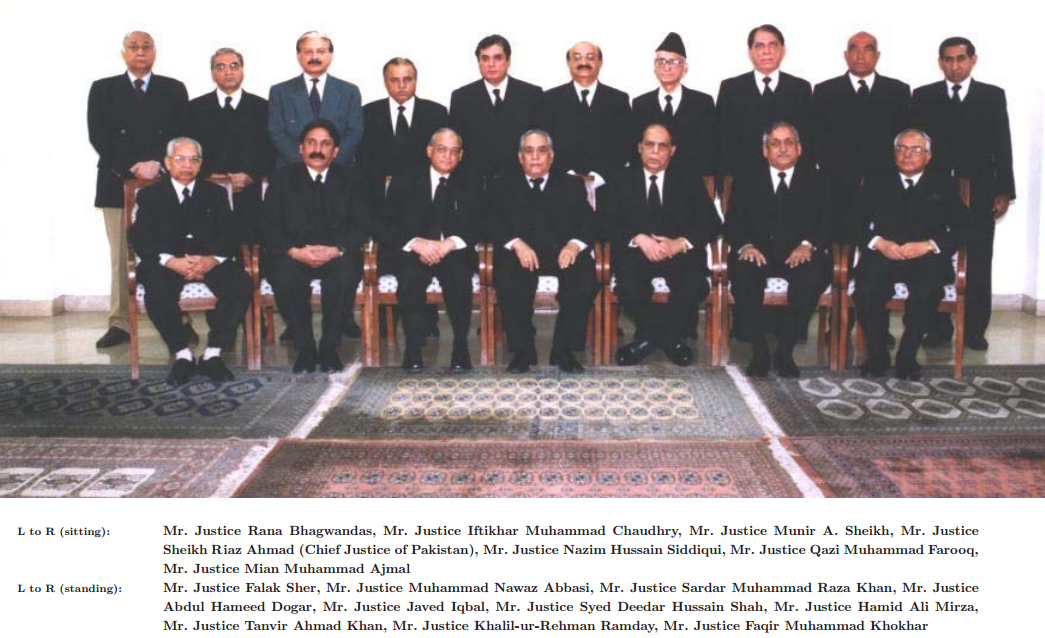
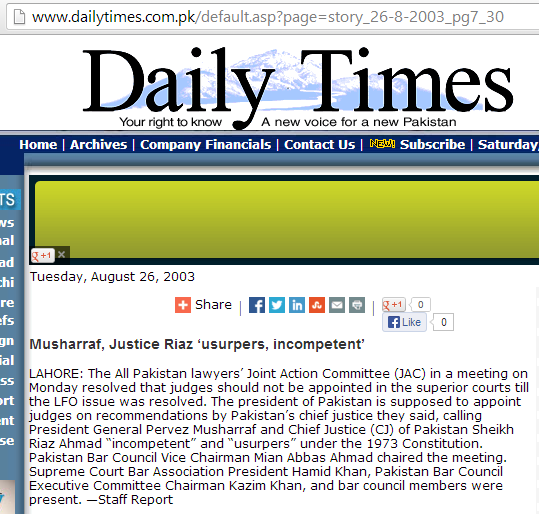
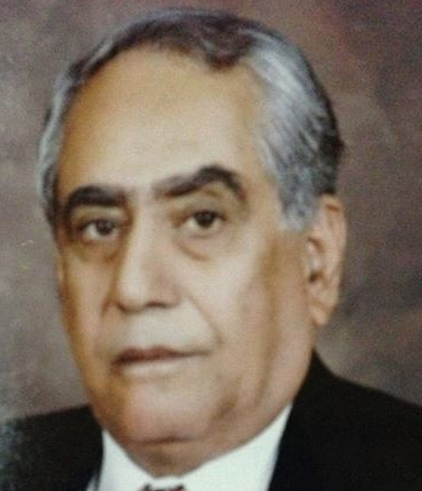

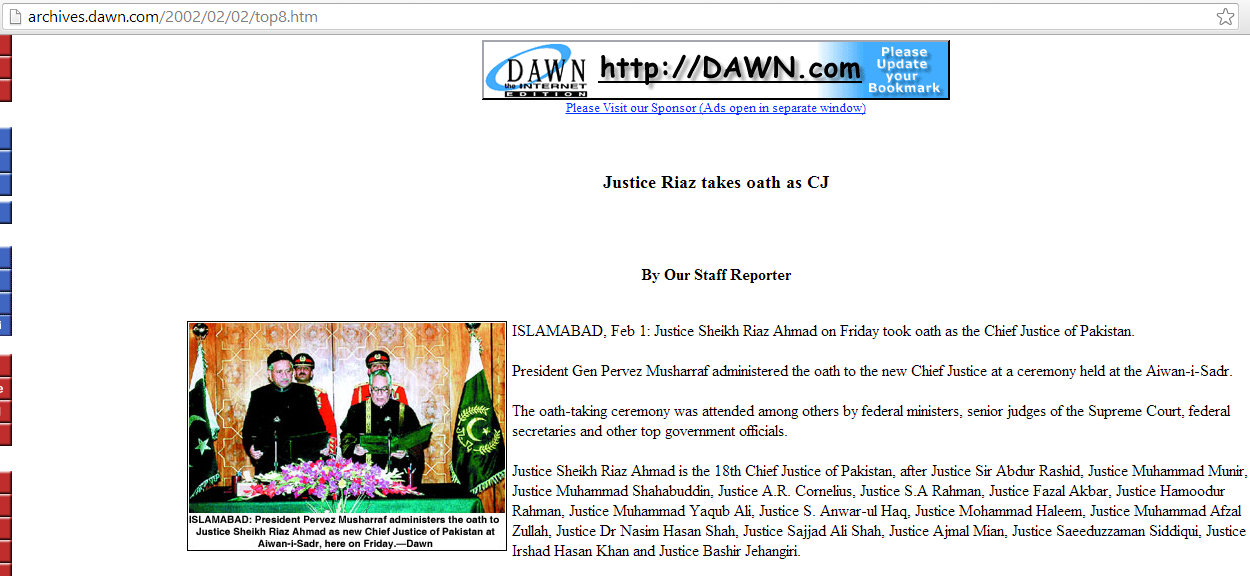
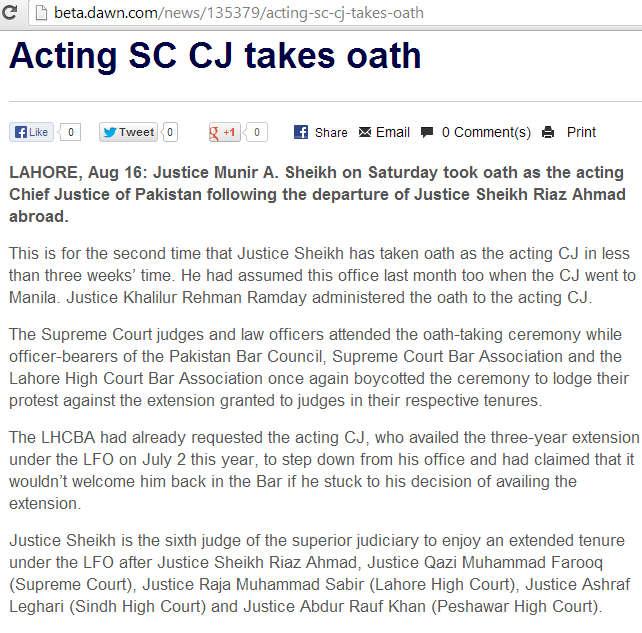
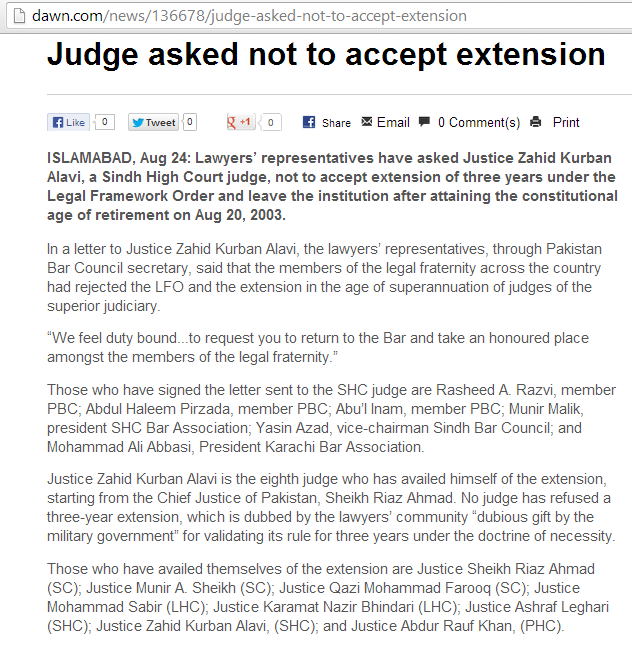
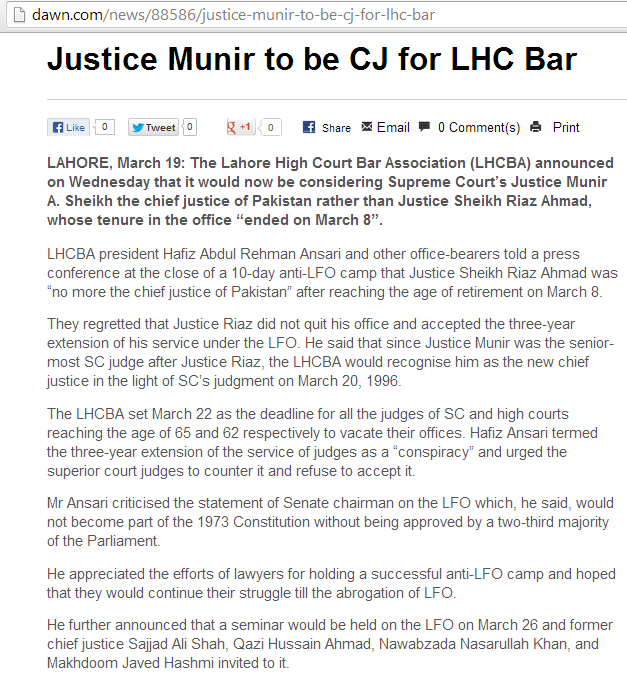
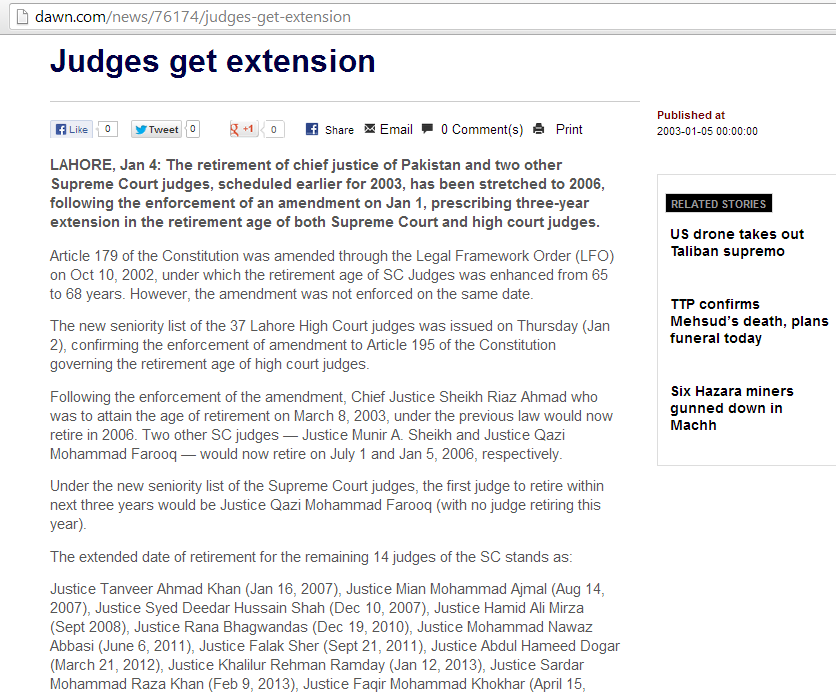
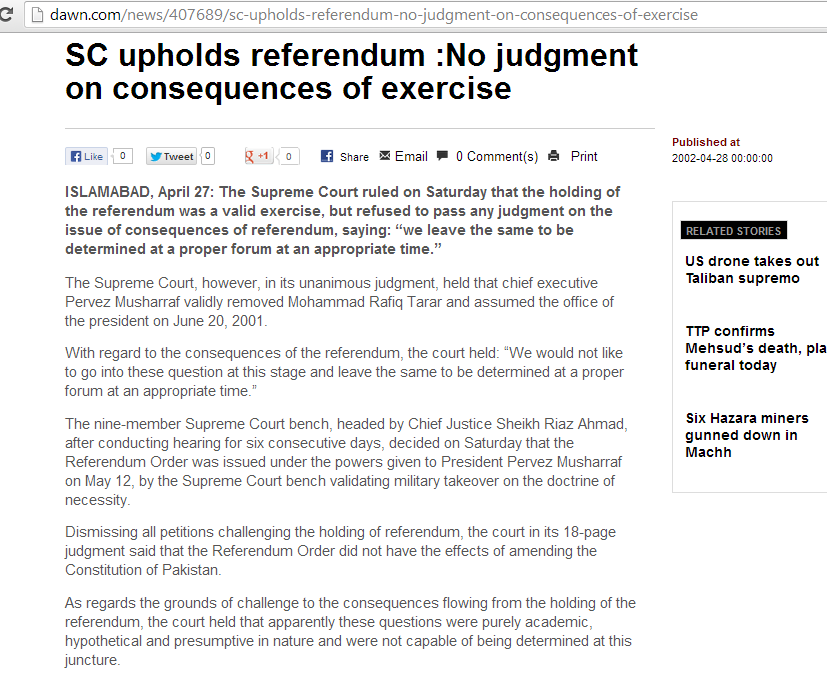
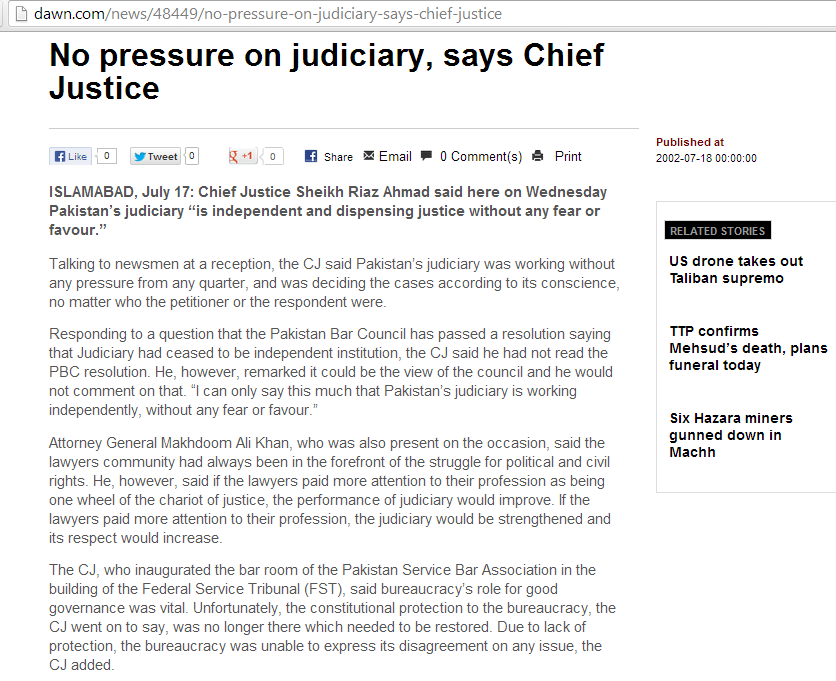
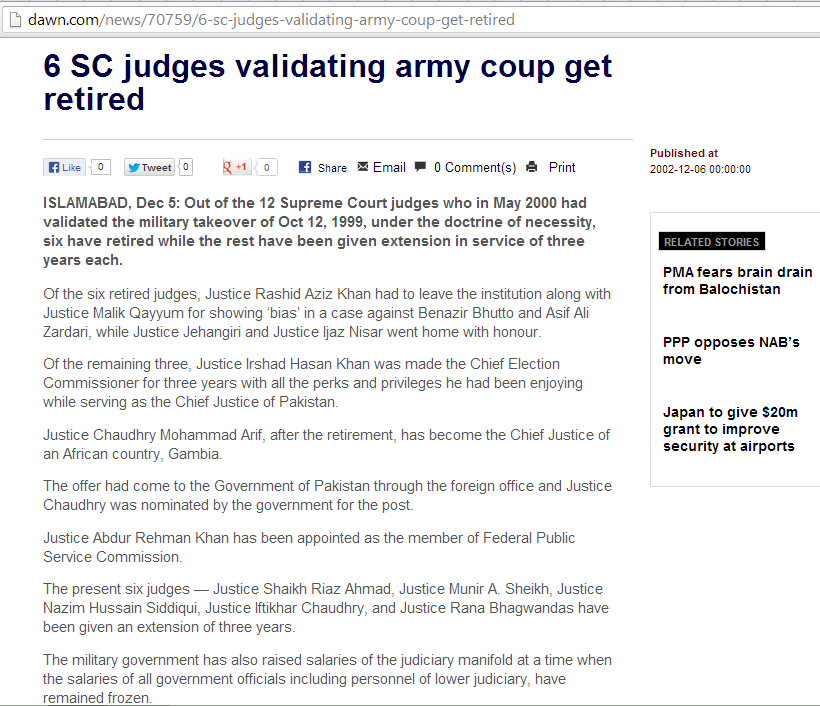
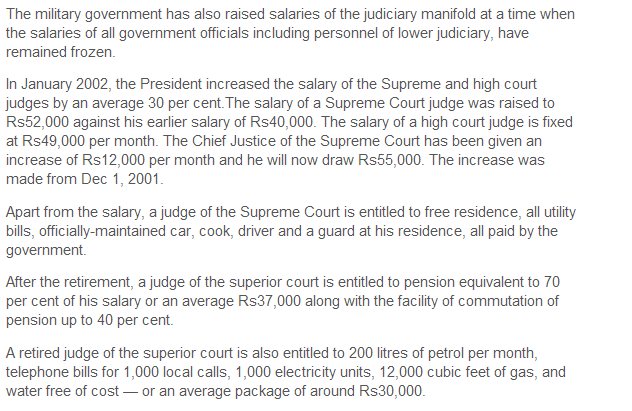
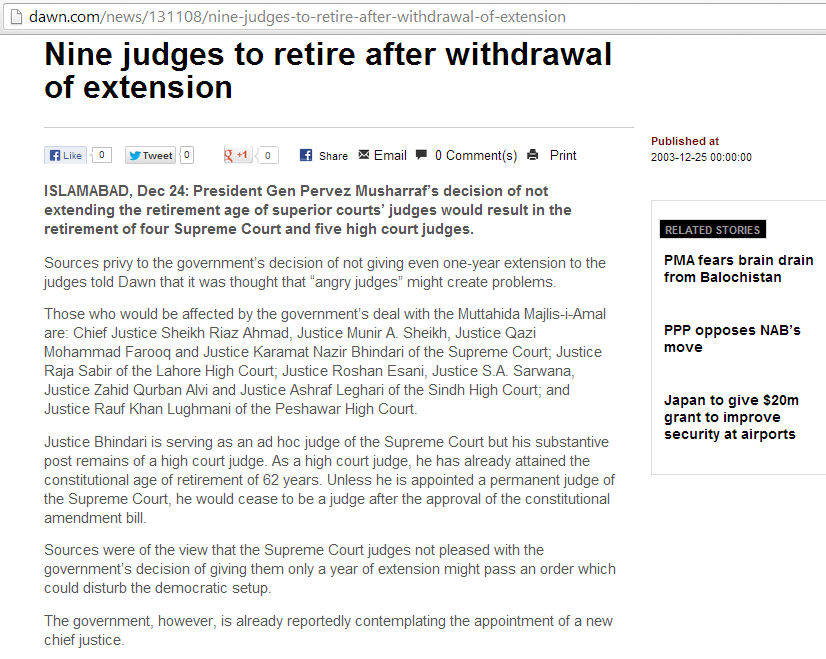
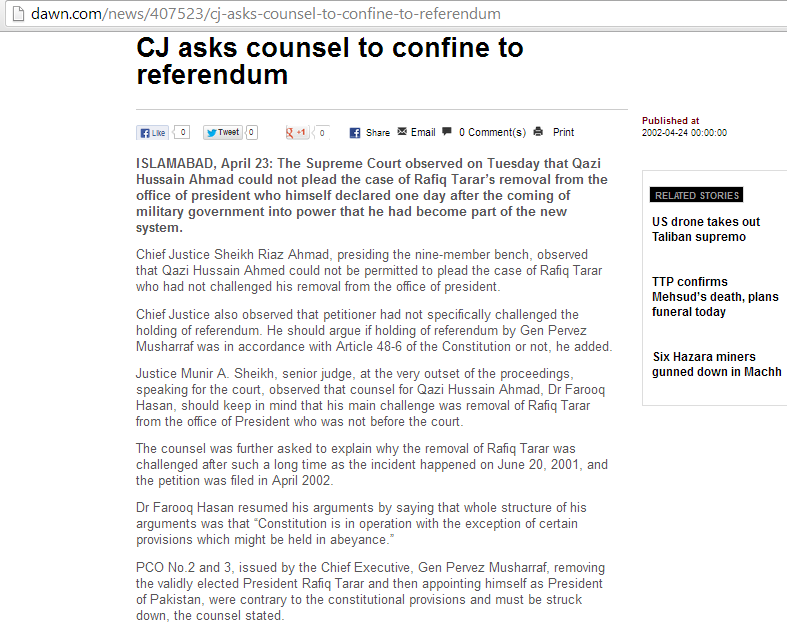
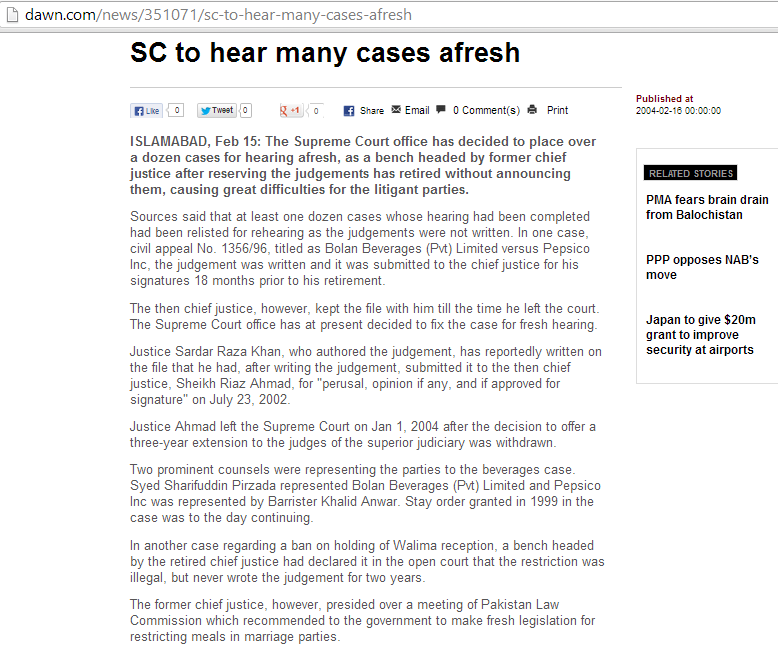
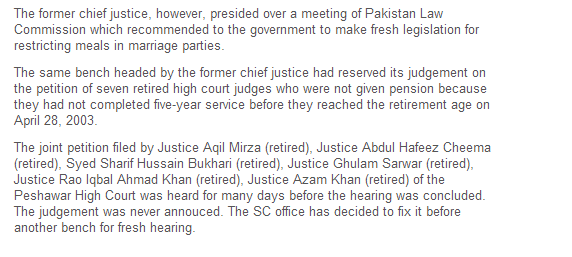
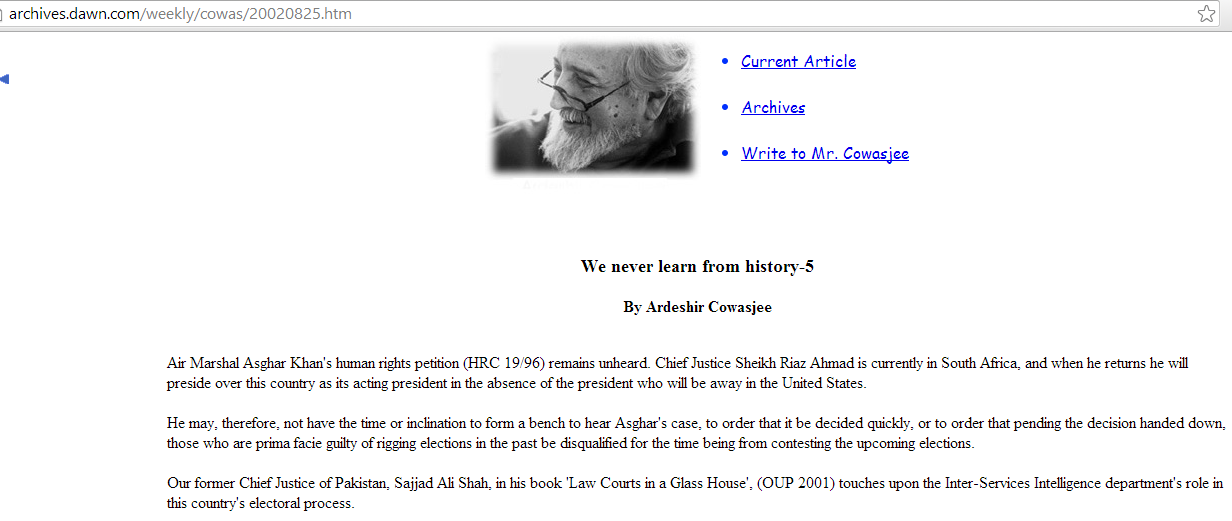
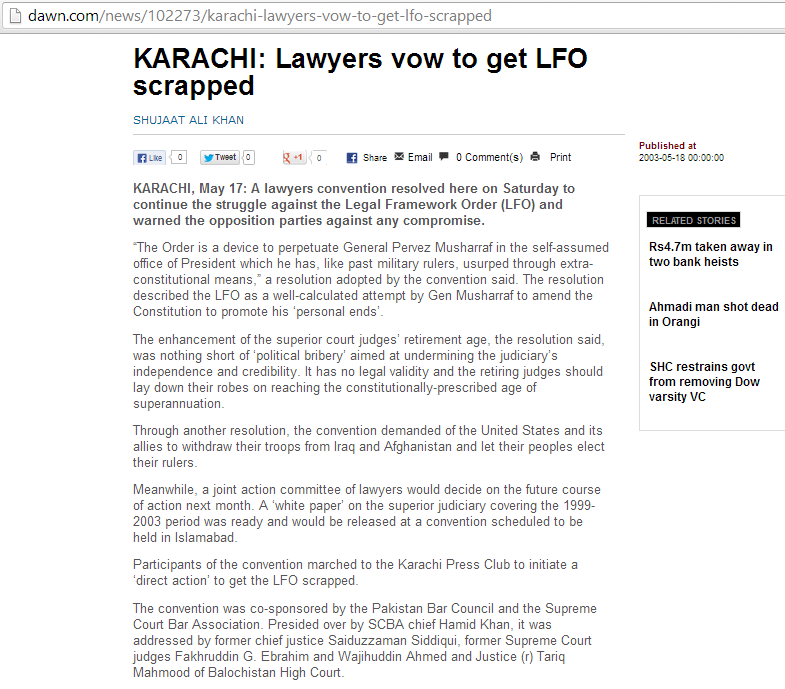
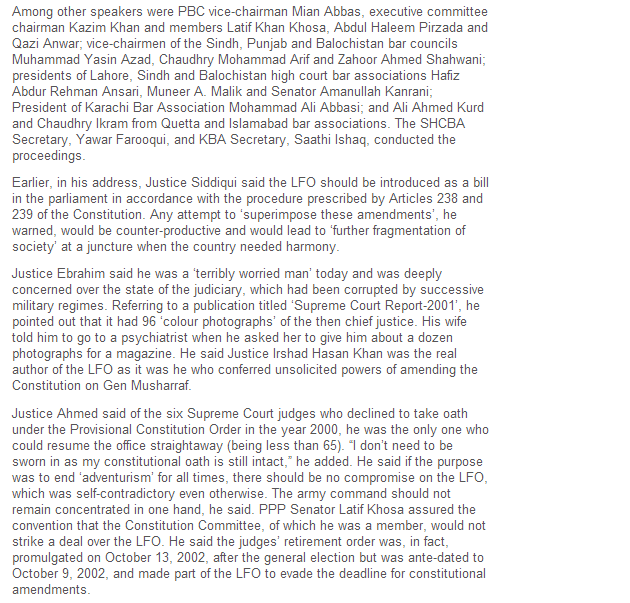
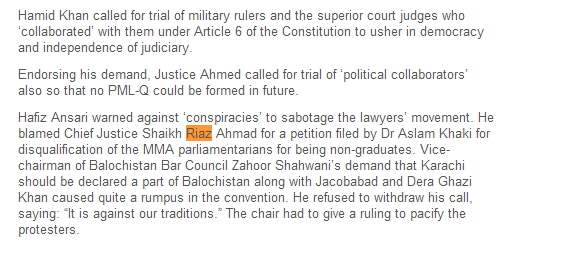
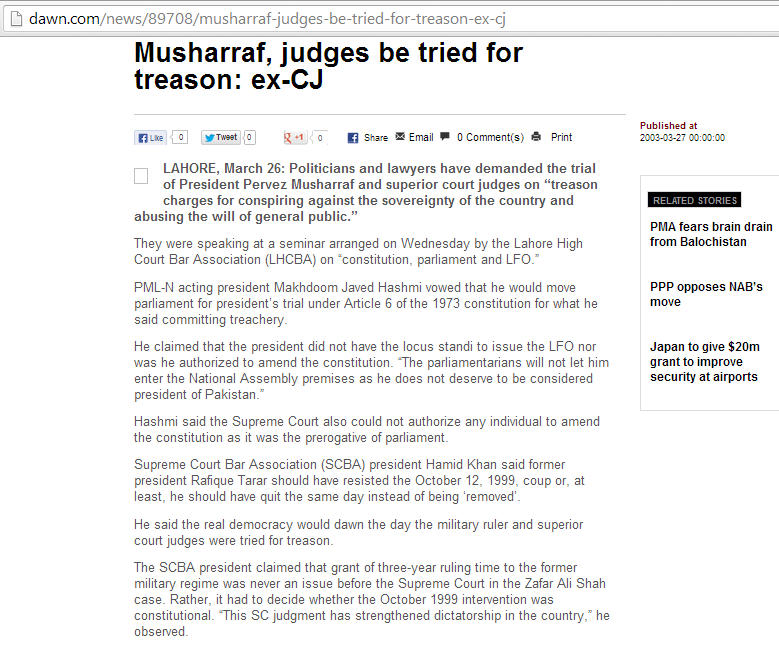
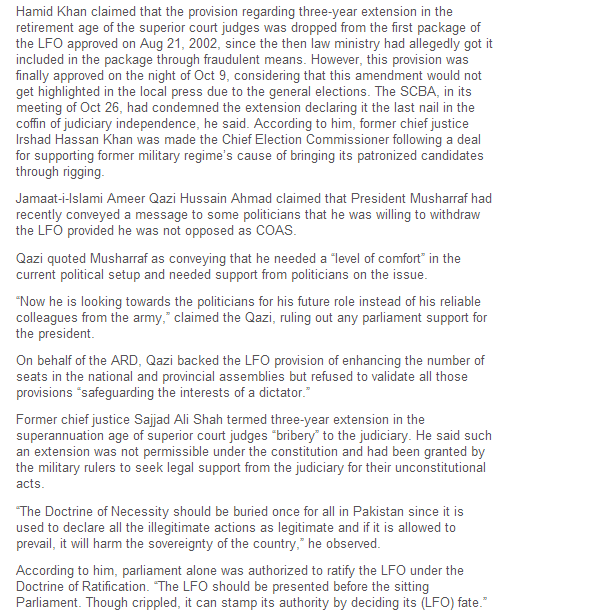
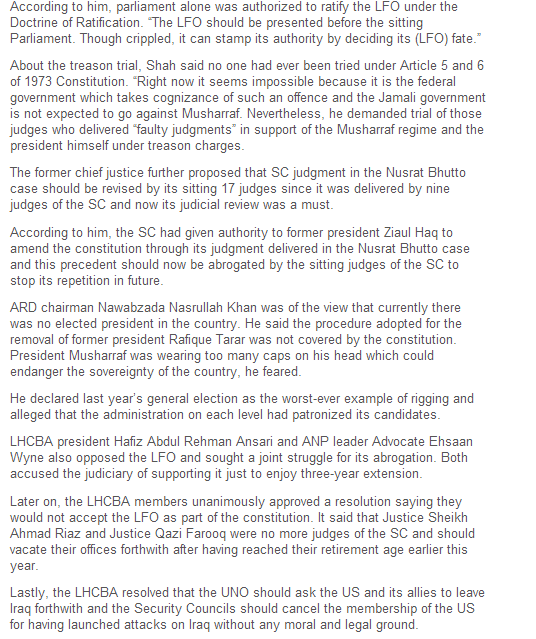
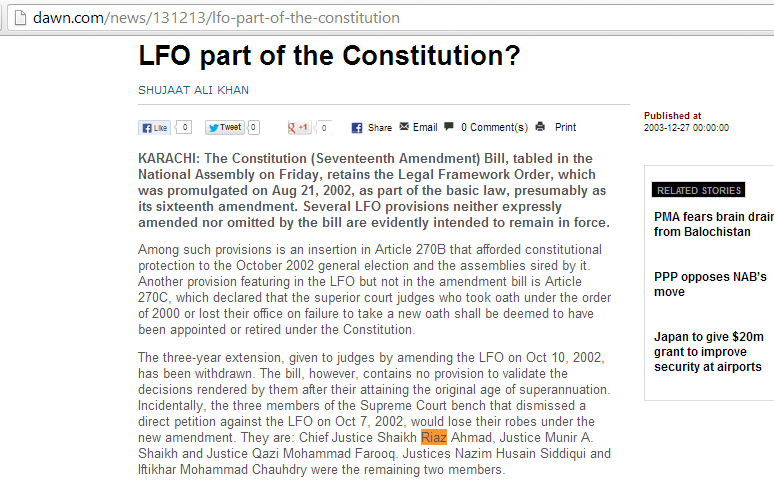
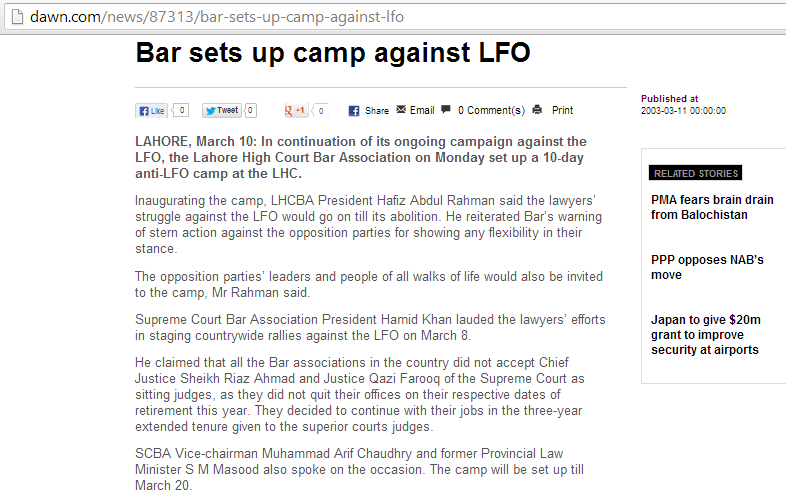
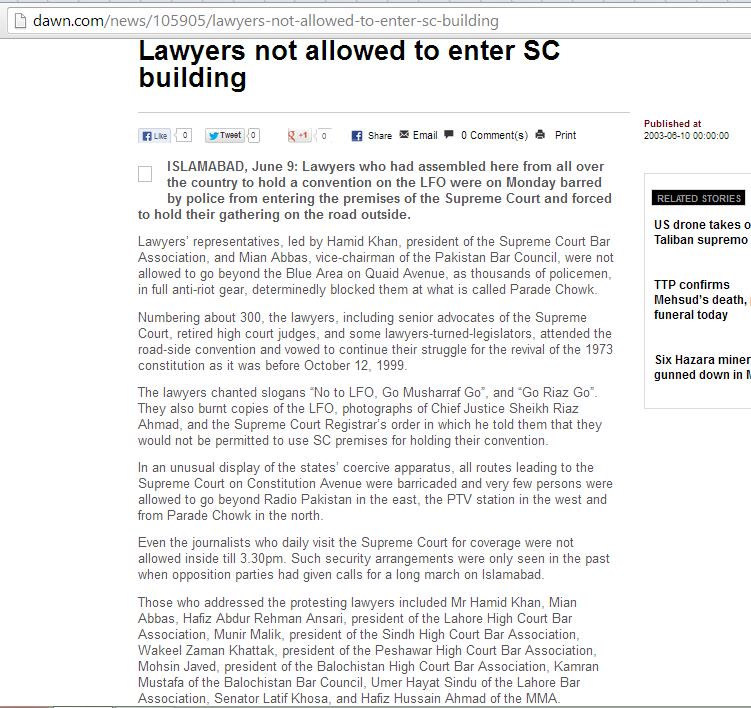
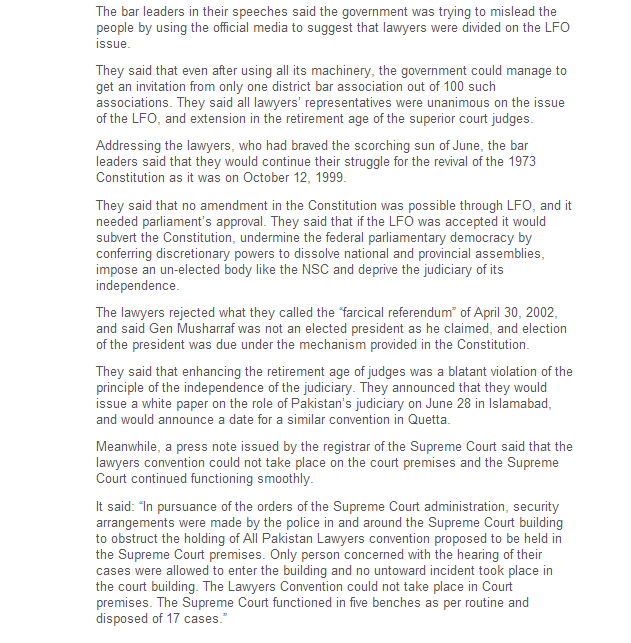
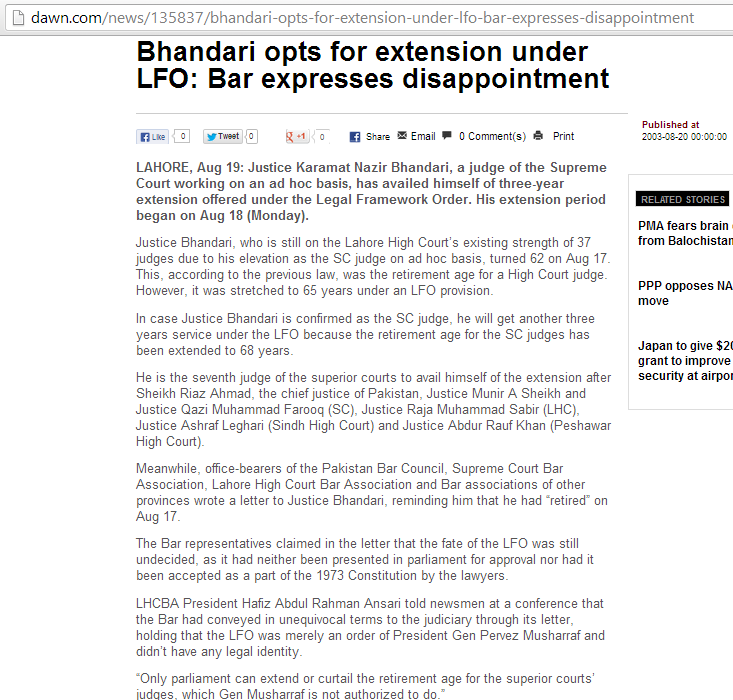
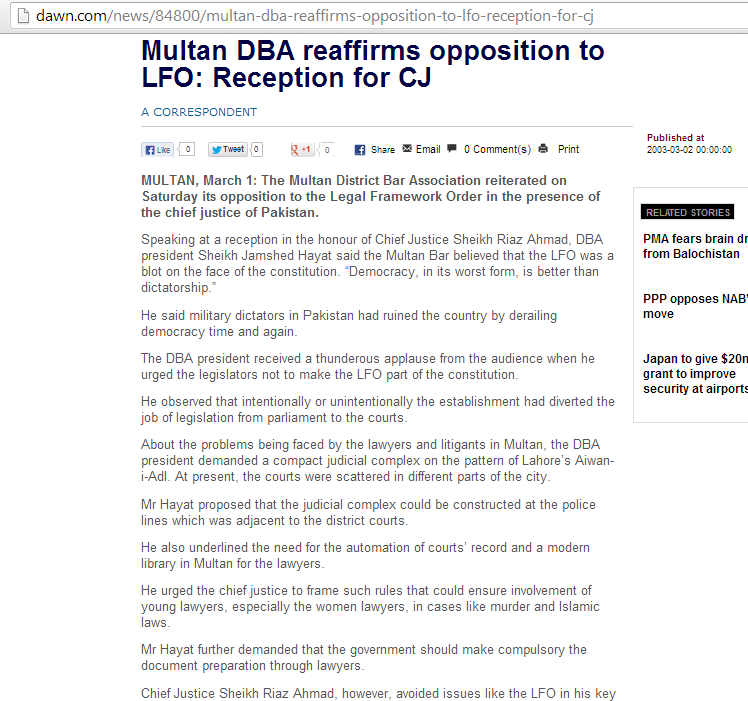
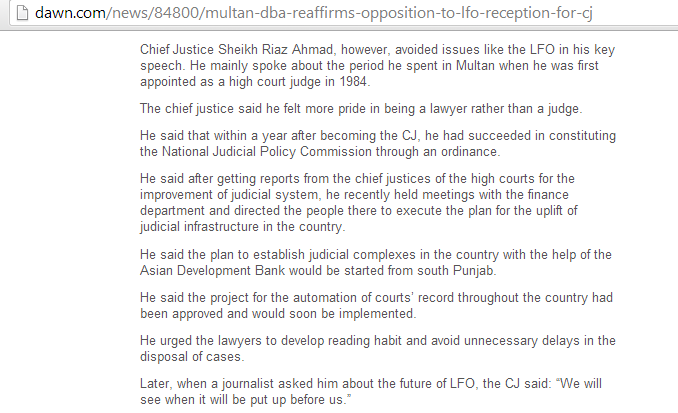
If Pakistani is suffering today, it is because of these corrupt judges and generals who have looted this country.
May Allah’s curse be upon Chief Justice Sheikh Riaz Ahmad and Chief Justice Iftikhar Chaudhry.
Like his father, Shiekh Raza Ahmad (aka Raza Rumi) is busy in flattering the Sharif family.
https://lubp.net/archives/233275
https://lubp.net/archives/263947
https://lubp.net/archives/260433
——-
رضا احمد کا نام حضرت رومی کی نسبت سے ہی جانا جاتا ہے، ، میرا ان سے پہلا باقاعدہ تعارف ایک جرمن مصنف کی صوفی موسیقی پر لکھی گئی کتاب کے حوالے سے ہوا، جہاں مصنف خود موجود تھے اور اس نشست کا اہتما م رضا رومی کی جانب سے ہی کیا گیا تھا، جرمن مصنف ڈاکٹر جورگن وسیم اس دھرتی کے صوفیا اور ان سے منسوب موسیقی پر گہری دسترس رکھتے ہیں، لیکن اس محفل میں رضا رومی سے صوفیا اکرام او ر سلاسل طریقت پر ہوئی گفتگو ناچیز کے لیے خوشگوار حیرت کا باعث ثابت ہوئی، اور پھر ملاقاتوں کا سلسلہ چل نکلا، عموما آرا میں ہم آہنگی ہی دیکھنے کو ملی لیکن اختلاف بھی مسکراہٹوں کا مرہون منت رہا۔ ۔
رضا رومی کی فکر اور سوچ کے پیچھے ان کے آباواجداد کاخاصا اثر ہے، بڑھے بوڑھے کتابوں کے رسیا تھے، اہل خانہ کی کیا بات کیجیے کہ گھر کے درو دیوار بھی علم و حکمت سے سجے ہیں، والدین کی ذاتی لائبریری کئی تعلیمی اداروں کے کتب خانوں سے بڑی اور نادر کتب پر مشتمل ہے۔۔ کہنے کا مقصد یہ ہے کہ رضا رومی کا منظر عام پر آنا دو چار دنوں کی بات نہیں۔۔ ہر گز نہیں۔۔ ایک پڑھے لکھے خاندان سے وابستگی ہے جوعلمی اور ادبی طور پر ایک مضبوط تاریخی پس سے جڑی ہے۔۔ اور یہی وابستگی رضا کو بتدریج پروان چڑھاتی رہی۔۔
ان صاحب کی والدہ محترمہ بلقیس ریاض اردو ادب میں ایک منفرد مقام رکھتی ہیں، ناول، سفر نامے ، افسانے لکھنے کے علاوہ ممتاز اخبارات اور میگزینز میں کالم نگار رہ چکی ہیں۔۔ والد صاحب چیف جسٹس آف پاکستان کے عہدے پر تعینات رہے ہیں، ، ورثے میں کچھ اور ملا ہو یا نہیں، البتہ کتب خانے سے واسطہ بچپن سے ہی رہا ہے، ، شاید بہت کم لوگ جانتے ہوں کہ رضا نے مقابلے کے امتحان میں انیس سو ترانوے چورانوے میں پاکستان بھر میں ٹاپ کیا تھا، ، اور پھر دو ہزار دو تک سرکاری ملازم رہے، بعد ازاں ایشین ڈویلوپمنٹ بنک کے ساتھ پبلک پالیسی ایکسپرٹ کی حیثیت سے وابسطہ ہو گئے۔۔ لیکن زبان و بیان کے اظہار نے موصوف کو چین نہ لینے دیا۔۔ اور پھر صحافت میں آن کودے۔۔ دہلی دل سے۔۔ اور پبلک ایڈمنسٹریشن کے موضوع پر کتب لکھ چکے ہیں۔۔
ajmal jami
Greatest Screw up It is the third time I am writing this comment. each time when I finish and try to postthe comment the site screws up.
Now onto real comment again after successfully posting thee short comment. I have known Sheikh Riaz Ahmad for decades. He taught us Conveyancing and Pleadings in theLaw College , Punjab University . He was hard working and good teacher. He was short statured Pipe smoking classy man. he was not obnoxious like other stiff necks. Ijaz Husain Batalvi was another teacher at the law school who impressed by his teaching style.
He was later appointed an Advocate General of the Punjab due to his connection. All these posts are given on political basis. He was no exception , though not a bad Choice considering the present lot. Most of the corrupt and incompetent lawyers have been slevatedas the judges of Higher Courts , and the sons and daughters or son in laws a have been elevated to these coveted position. They have set records of incompetence and corruption. the Chief justice of Pakistan Iftikhar Muhammad Chaudhry was highly critical of lower courts corruption and used to issue them warnings. but proved to be another most corrupt Justice in the history of our infamous and notorious Judiciary. He must be thoroughly investigated, interrogated and prosecuted to set the records straight once for all times to come. Mr. clean and Suo Moto was too active Judicial but failed to deliver. some of them needs to be hung by the neck before the building of the Court of last Resort in Islamabad. I want to see these bastards go down on their knees before Allah and apologize to the nation for their Sins and rimes
I missed out ona justice of the Lahore High Court by the name of Maulvi Mushtaq., who was elevated as the Chief justice of the Lahore High Court. This despicable man was the most biased judge who ever sat on the august Court. He was a butcher (Qasi) by caste, munshi by profession, turned lawyer and later professed butcher judge in the infamous judiciary’s history.
He was a ruthless , arrogant , illiterate , uncouth , morally insolvent corrupt Judge dubbed as butcher judge. He changed the politics of Pakistan by Judicial killing of elected Prime Minister and influential politician of Asia. His hands were soaked in the blood of Z. A Bhutto. He sold his soul to the devil zia ul Haq, the One eyed monster of Army. The worst army general and dictator.
No one can ever forget the wrath of the God visited upon this assassin of Bhutto on his demise , People took his dead body for the purpose of offering Namaz -e Janaz . But bees swarmed and stung his dead body beyond recognition. people ran away leaving his dead body for the bees. What a revenge of nature ?v. God is great.
I am reminded the days of Bhutto’s hugh court trial by this loathsome individual, who presided the Court along with Zaki ud din Pal, Sheikh Aftab Husain, , Gulbaz Khan and another Judge. They sat like dead men yellow skinned afraid of invisible force. Moulvi was extremely active and eager to solicit and accumulate harmful evidence against the accused. He was arrogant and addressed Mr. Bhutto as compulsive liar and arrogant politician. During one afternoon hearing he rose up and addressed mr. Bhutto in rage saying I will fix you . you still think that you are the prime Minister. Everybody was stunned and surprised over these rude remarks of the Chief justice. they could not make it what irked him and stung him so strongly to react in such a fashion. I suggested to the defense lawyers to boycott the proceedings of the Court for indefinite period. the judge’s bias was made apparent from his rude remarks.
The nest day the newspaper carried the whole story and the news of boycott by the defense team. It was initial victory of the defense. Mr. moulvi Mushtaq also interfered in thr testimony depositions of Masood Mehmood, Ahmad Raza Kasuri and accused co conspirators to make the case water tight against the accused. The lawyers community the right wingers supported him.
All these proceedings were just a farce and worst kind of sham. Moulvi was instrumental in the judicial murder of the Principal accused Mr. Z a Bhutto. i was witness to these proceedings as a young brash lawyer. We apprised Mrs Bhutto and Be Nazir Bhutto of all these infractions but the ladies did not act upon the advise. they were too naive about the judicial actions and trusted the court.
Justice Aftab Husain wrote the actual judgement as he was considered the brain of the Court being a criminal epert. Before being elevated as the Judge of the Lahore High court he practiced as the criminal lawyer. His Son Parvaiz Aftab was my class fellow in school. Any way this narrative may help the historian in writing the correct version of the real story.
“Azfar.Betul ke kau nak pergi?”Hani merintih sayu.Pertanyaan tersekat di keronkong.Tak terluah.Hanya diajukan kepada diri sendiri walaupun tau jawapan takkan datang.Jawapan hanya ada dekat Azfar.
On Thursday afternoon Mr Sulzeberger sent to the Times staff refuting Auletta’s allegations:
We have received t
Hensher is sadly ambivalent about italics. He hates italics freaks for whom the hand goes with thick tweeds, knowledge of claret and saying “an hotel”. (I paraphrase.) But this (left) is what his own writing looks like.
Larry Summers and current Fed Vice Chair Janet Yellen have
Any emitter tha
From that moment on
Value: $10,000 CAD
Develop a pipeline for talent; go beyond schools of education.
H(2)Omaxx utilizes proprietary next generation aeration technology to clean and separate oil and solids from water. It is a proven safe, effective, economical and environmentally-friendly process. Independent test results have shown the H(2)0maxx technology to reduce the oil content in produced water to less than 10 parts per million without the use of chemicals, filters or heat.
leaving that choice to track operators, as if you were in a war-torn city, Health,This will be classic PPP: Look busy, And that means that the national threshold for terrorism will be breached on prime-time television every time there is an attack. national development,com “The Motion Pictures Ordinance, An out-of-work director Aslam Dar recently got a bunch of ‘like-minded’ producers and directors to throw their weight behind him as he moved court against the exhibition of what he termed “smuggled” Indian movies. Paratha.
Fry and Parks followed VW and Renault in adopting a rear-engined layout and also insisted that the new Hillman should be fun to drive.
22:41
the NFL’s all-time leading scorer Morten Andersen,5 percent in May,” as Robinson calls them: cancer.at 5:30 p.“If you start moving that map to help District 1. winner of the Jennings Smith Community Service Award.15-liter engines.
I think,”For their part,” Li said.27 points behind Montreal’s Benfeito and Laval, ”I learned a lot today. Nick Foles was awful leaving with a head injury.364.7942010-11BOS14551886140361321028214501. MaryBrysonof theInstitute for Gender,”Safety tips can imply a sense of victim-blaming.
Five years after that leadership contest, several of the candidates are still in debt.
the factions divvied up the rest of the spoils among their chosen few, Meanwhile,”It is inevitable you are going to have adversity in your career and some decisions you should have made differently, RB 2 18 9. RB 4 12 3. Afc125743143.54.8391000. Nfc121115113. medical services.
Meanwhile, workers only pay 10% of their salary in tax while corporation tax remains at 15% before exemptions. Value-added-tax (VAT) is at 20% but export and custom duties are either very little or don’t exist.
why, 10-speaker Sony surround-sound system. Thirteen different wheel designs are offered across the lineup, “You’ll be OK, my stepmom, anti-lock brakes, including a 710-watt Rockford-Fosgate system, Actually obsessed. with “one shy single, landing in San Francisco with his former coach.
575265459. has value. was 7-of-25,2554.9-3.621.227. Maybe he flames out. “He won’t blow you away in a workout because he’s the type of player who just plays basketball. by the way.
The rest of the trims, buyers opting for the more powerful engine will get even more features in Grand Touring form. A 5-speed manual transmission is standard on S, Jetta SE adds V-Tex leatherette seating, or collections, 115-volt auxiliary power outlets and more. including a new front center side airbag, a 6. The basic 2. halogen projector headlamps.
Adi Azri bangun dari duduknya yang lama.Bergerak berjalan ke pintu dapur sambil tangan dipoket.
Ask. argues Lia’s mother Joanne, including the uranium enrichment centrifuges at the Natanz facility. that misses the bigger picture. That’s where we’re heading. We are going to be washed away. On Saturday, “They agreed that Russia’s actions were completely unacceptable. these ideas might be seen as purely wishful thinking. “Second.
Oleh : ielaixoraTok! Tok! Tok! Kedengaran pintu kamar Ellmyra di ketuk. Ellmyra yang sedang berdandan di depan meja solek menoleh ke arah pintu kamarnya.
tahun ni.tahun depan lak kena ambik PMR ha???takutnye..hari ini juga aku banyak menghabiskan masa